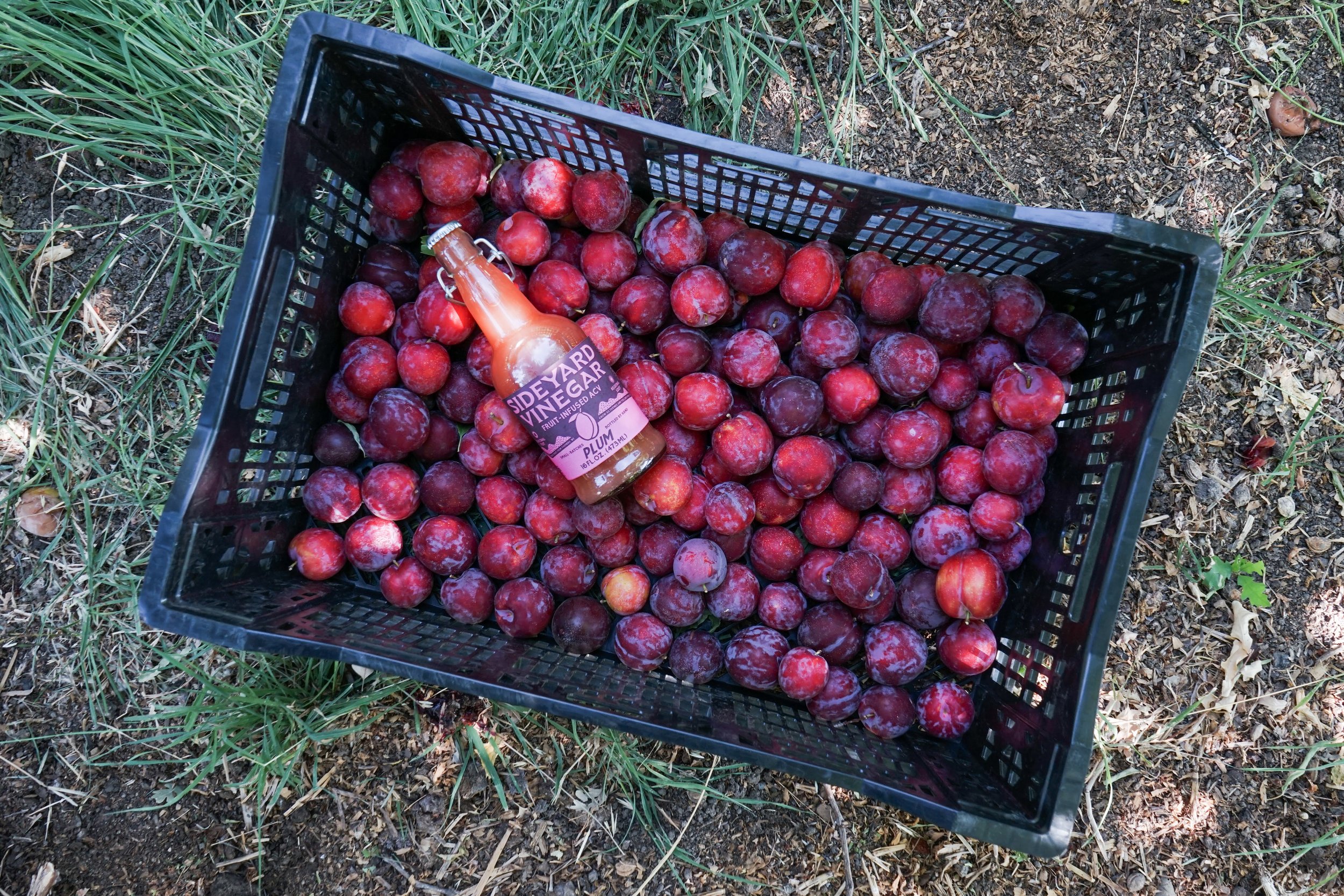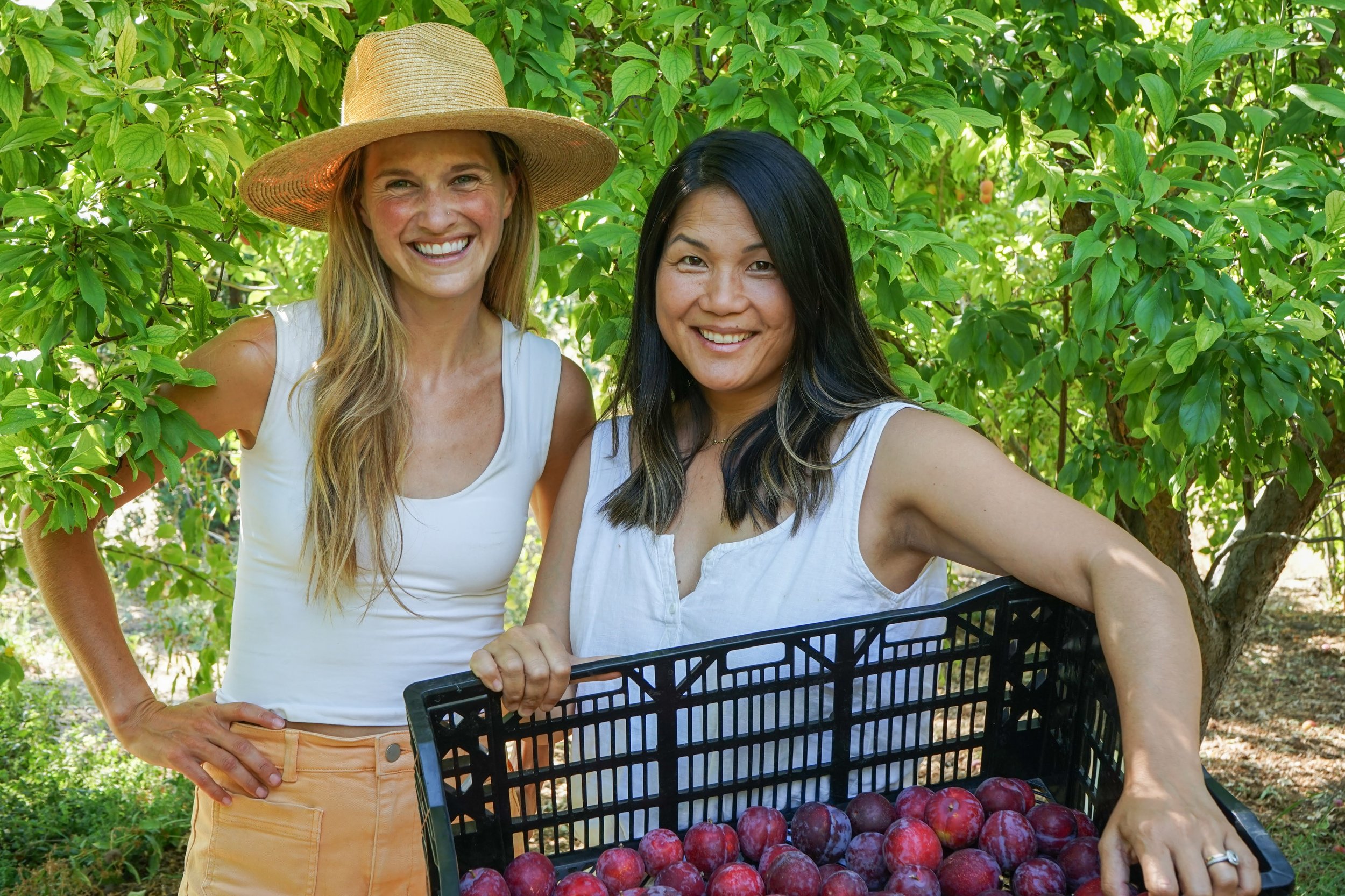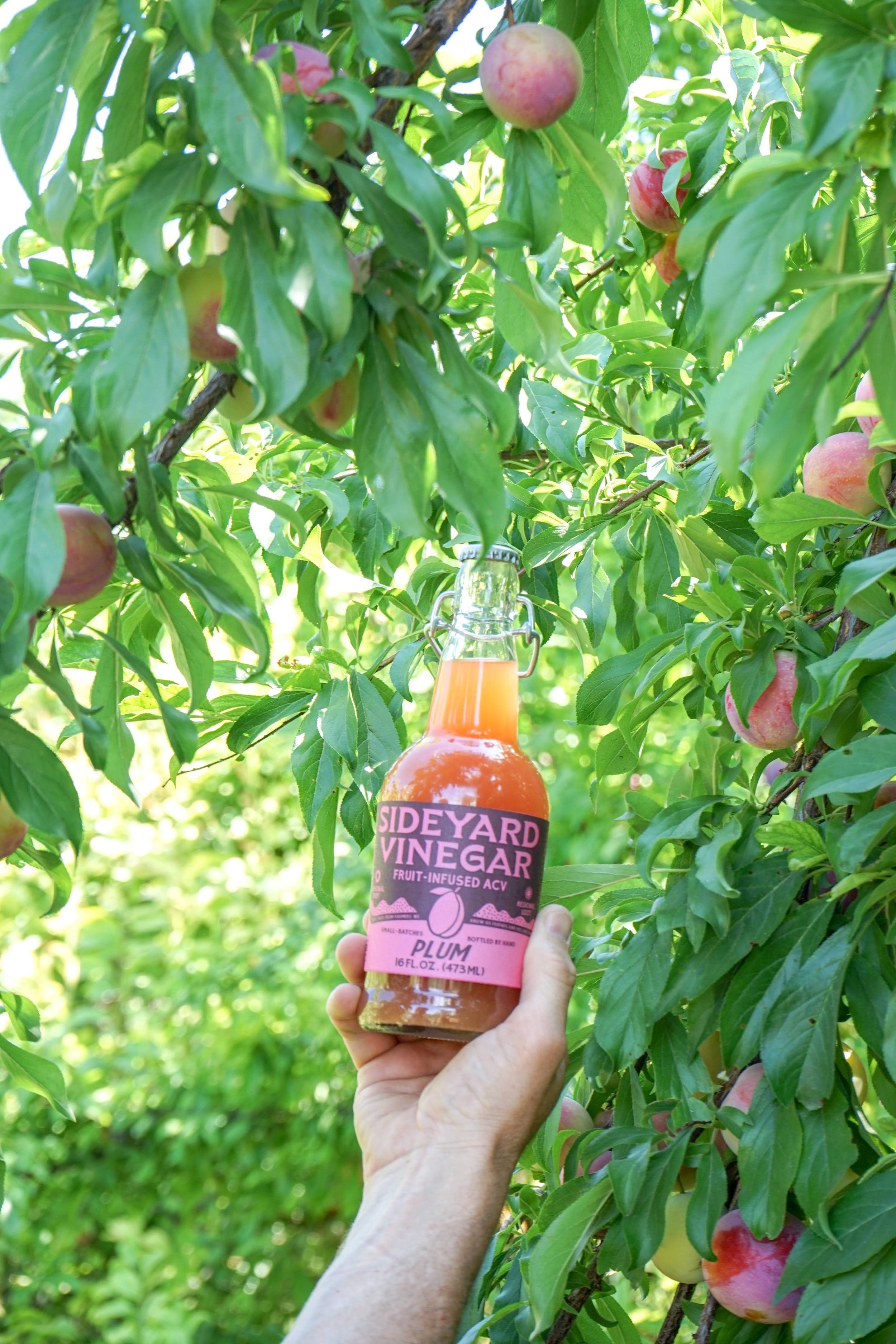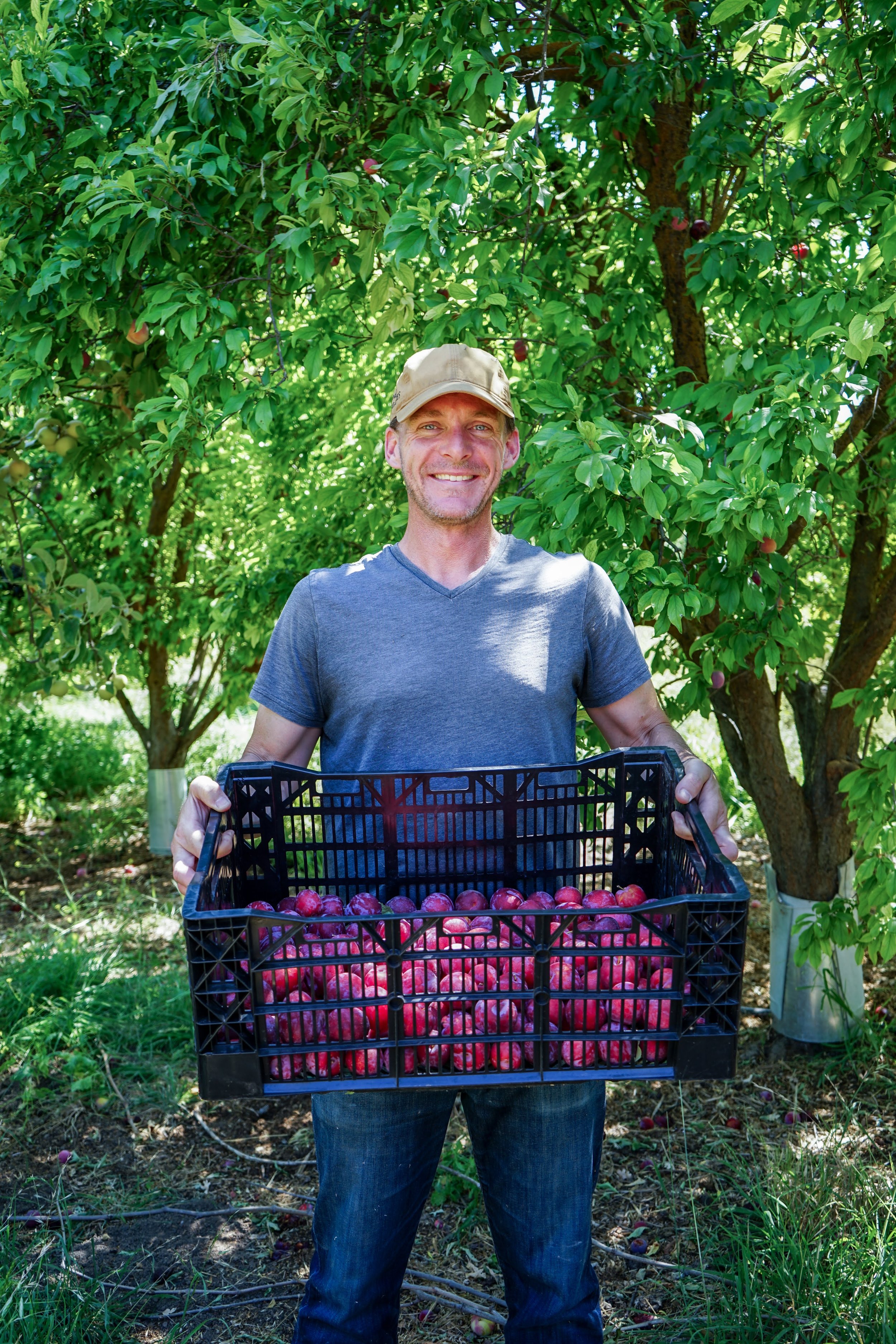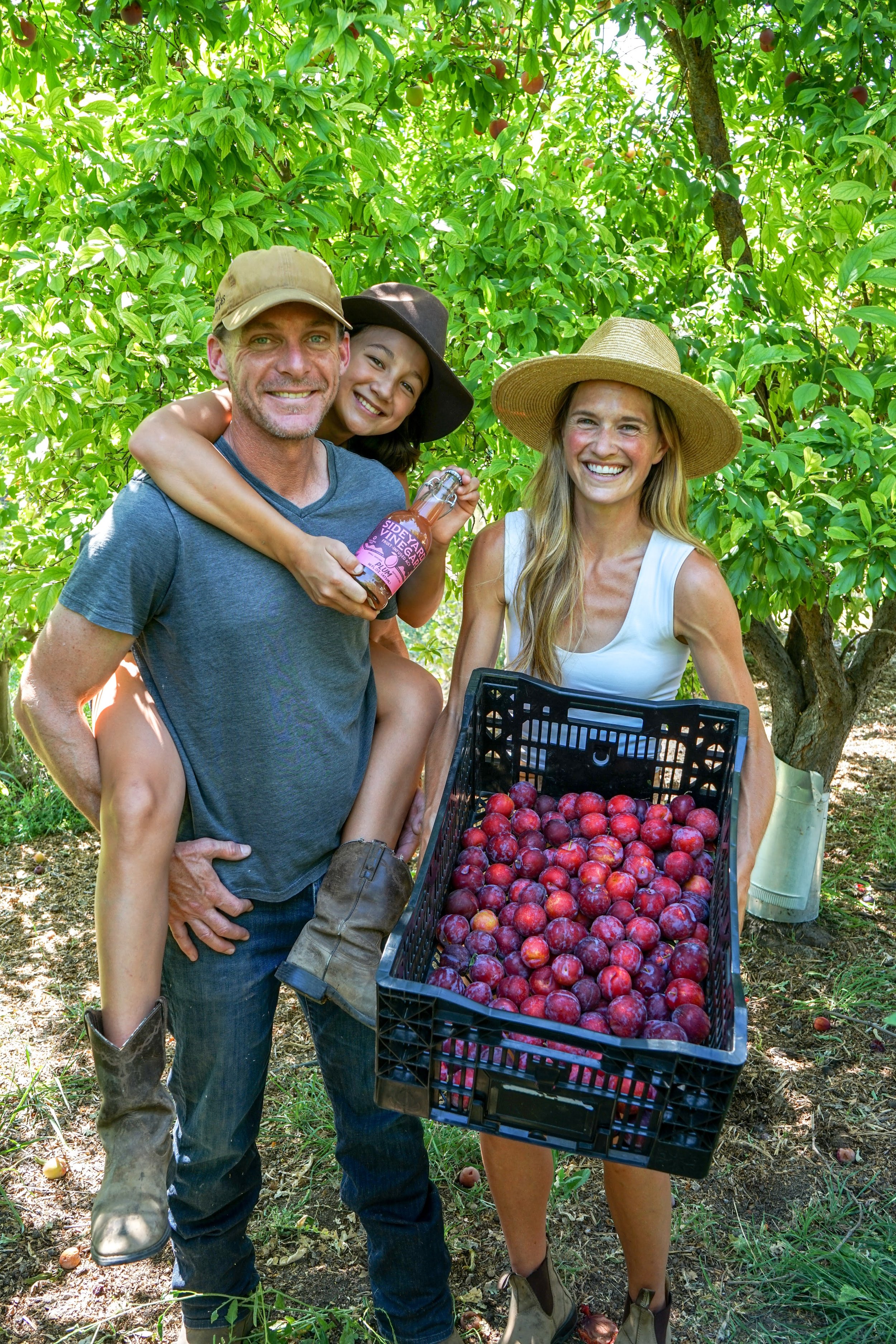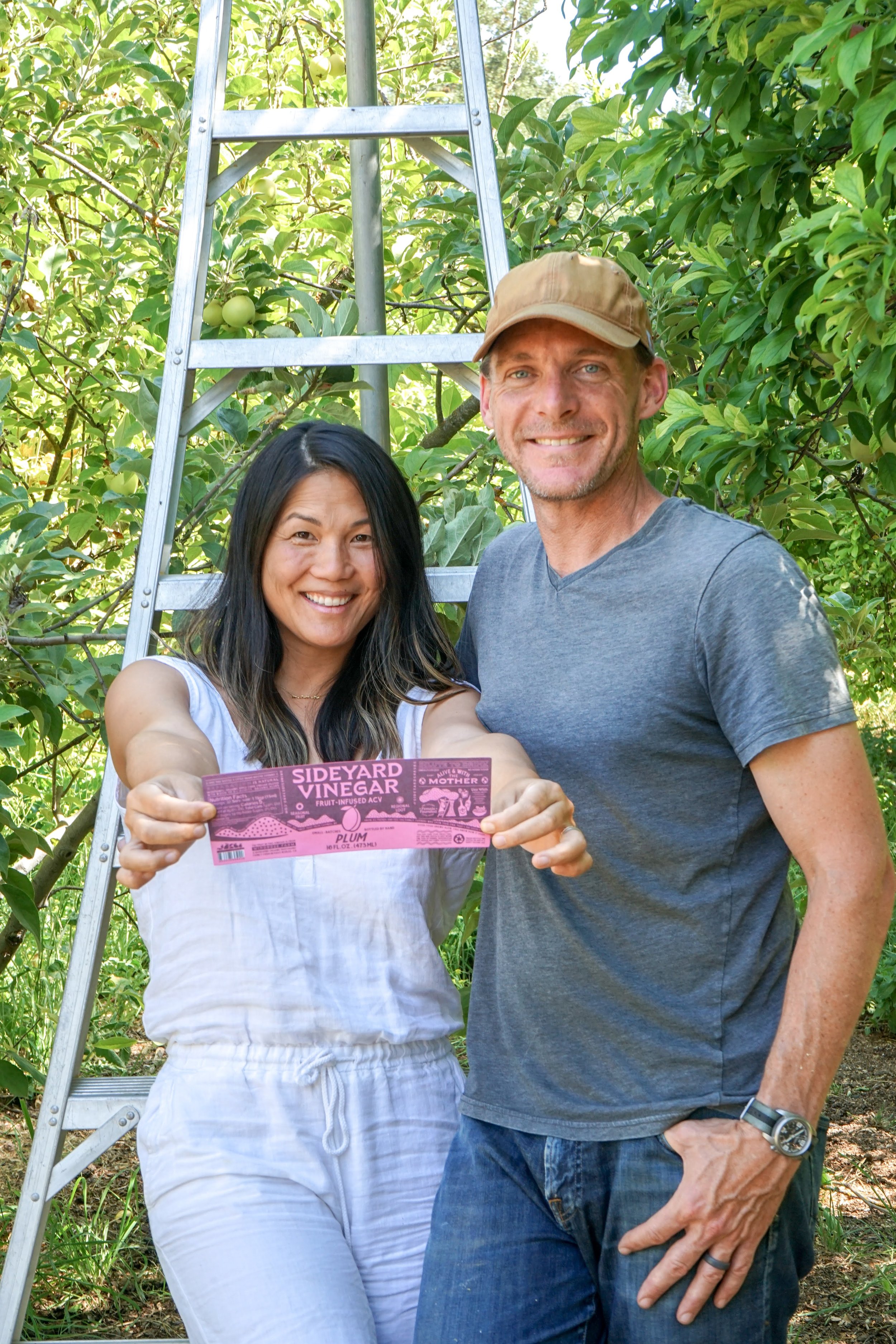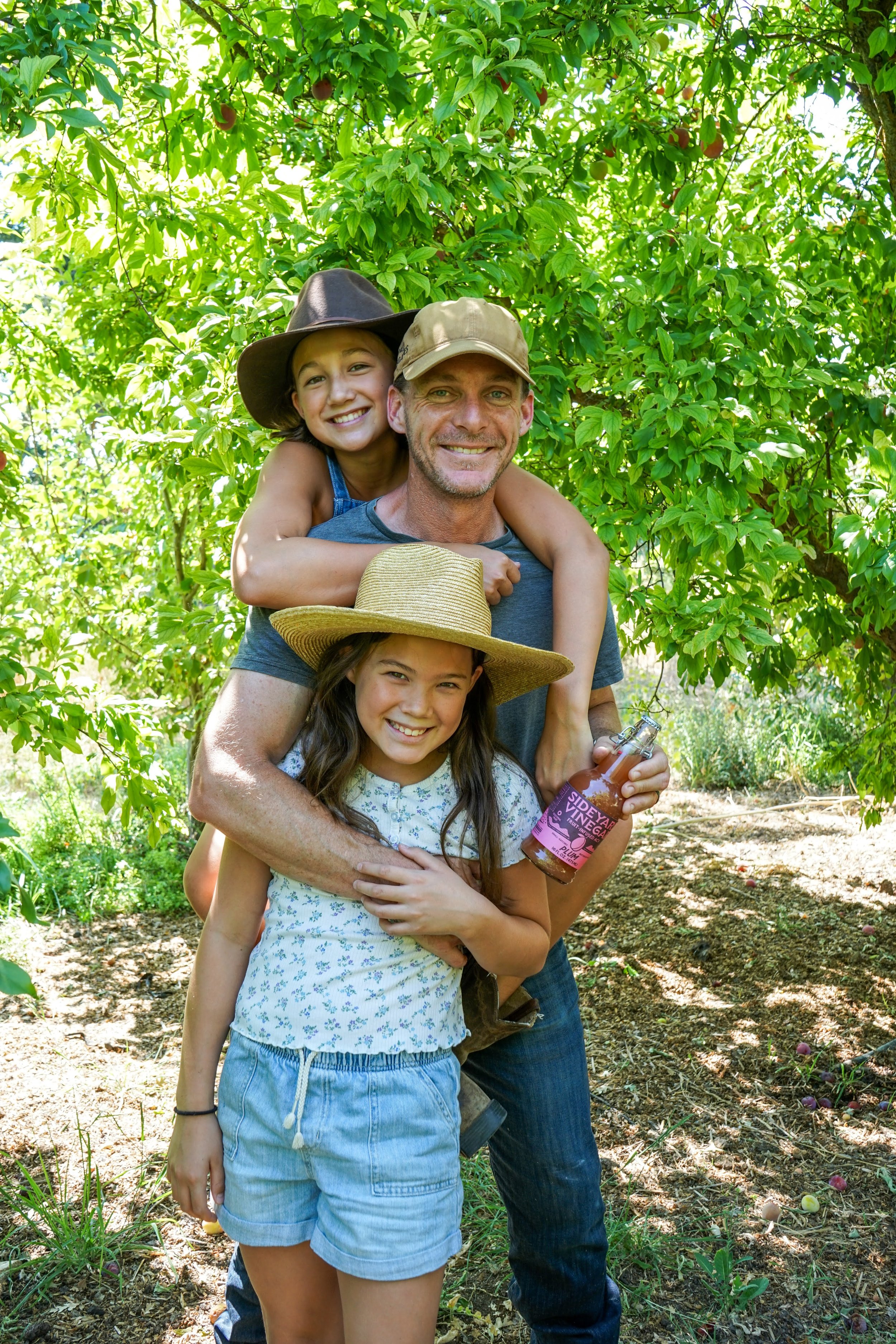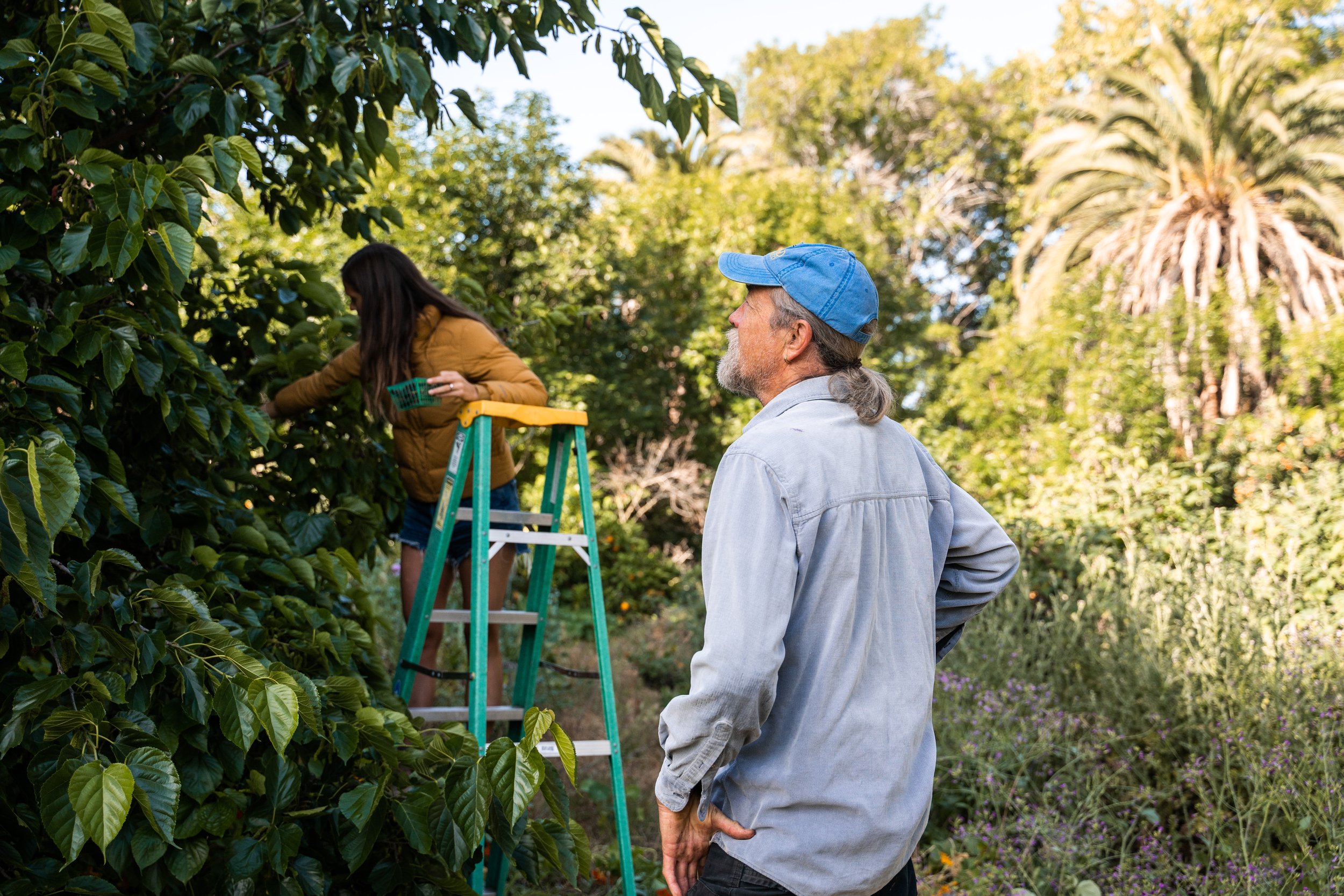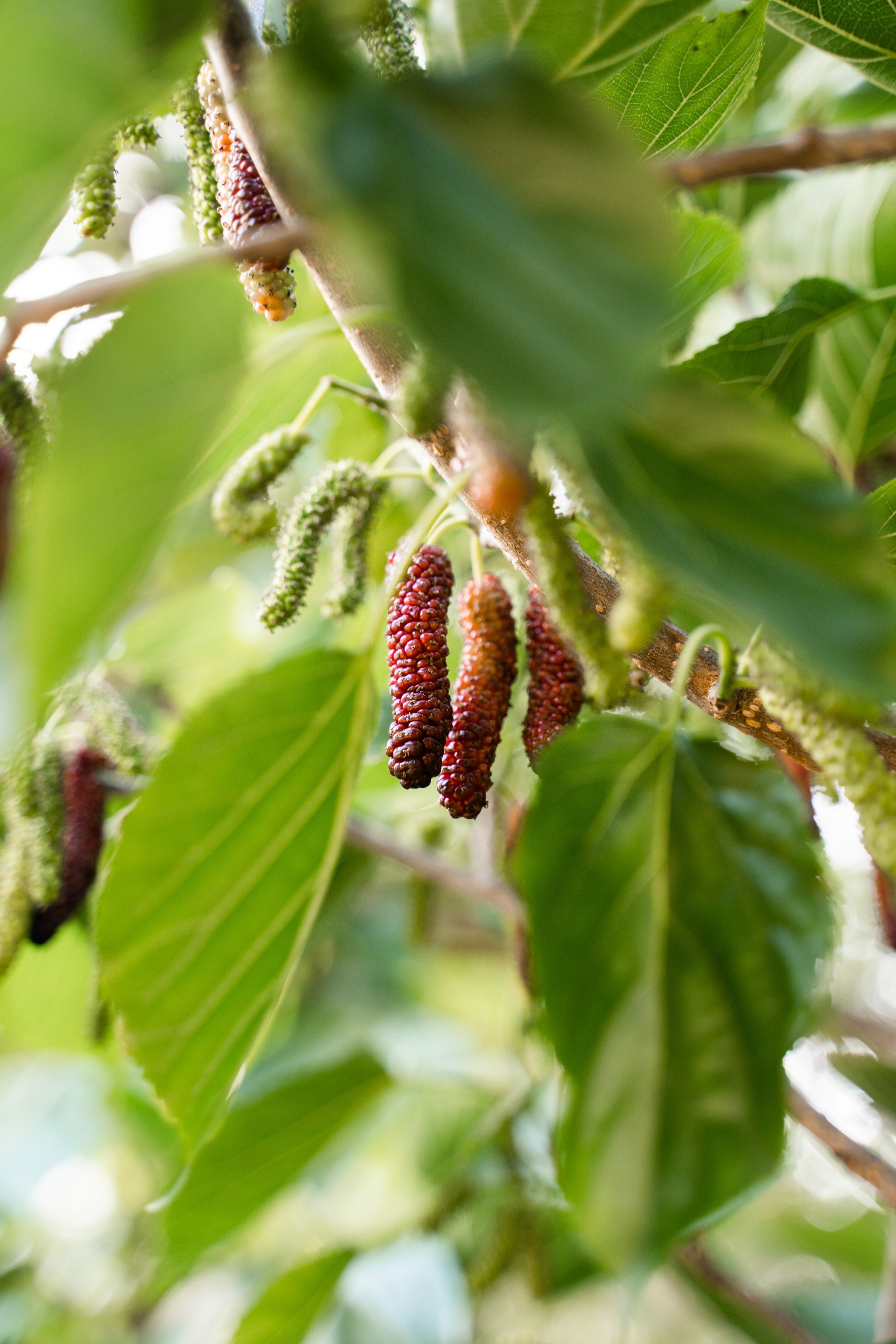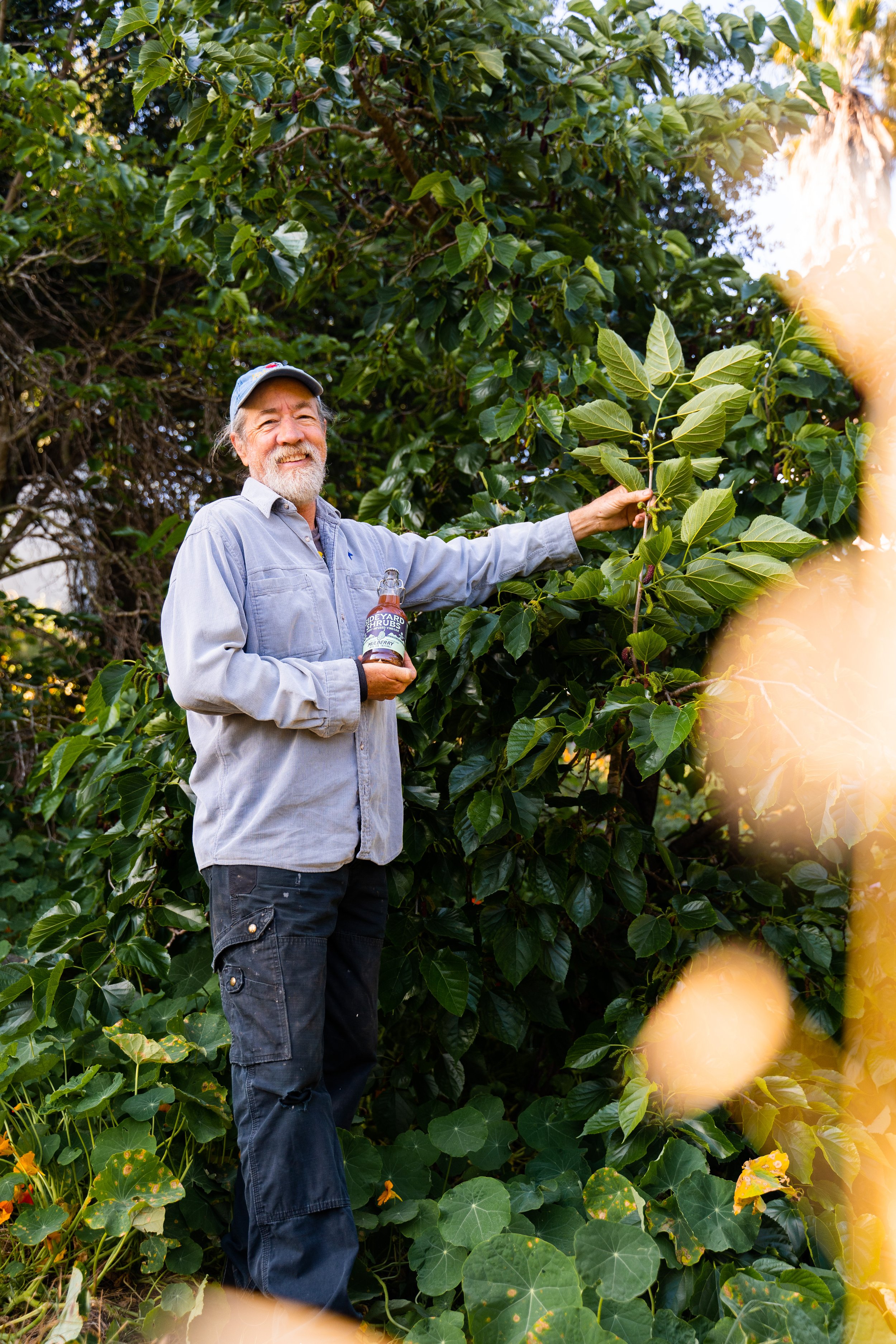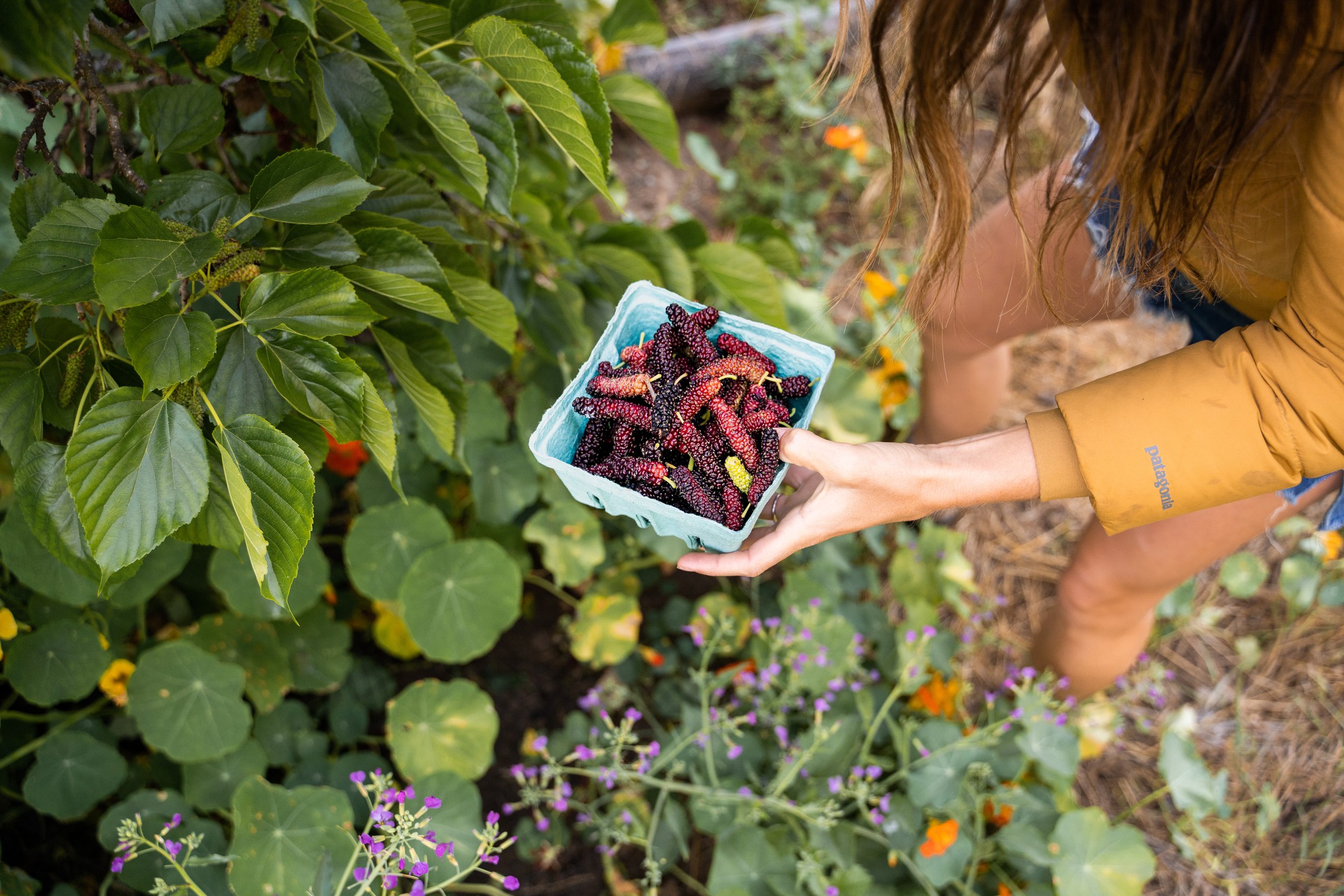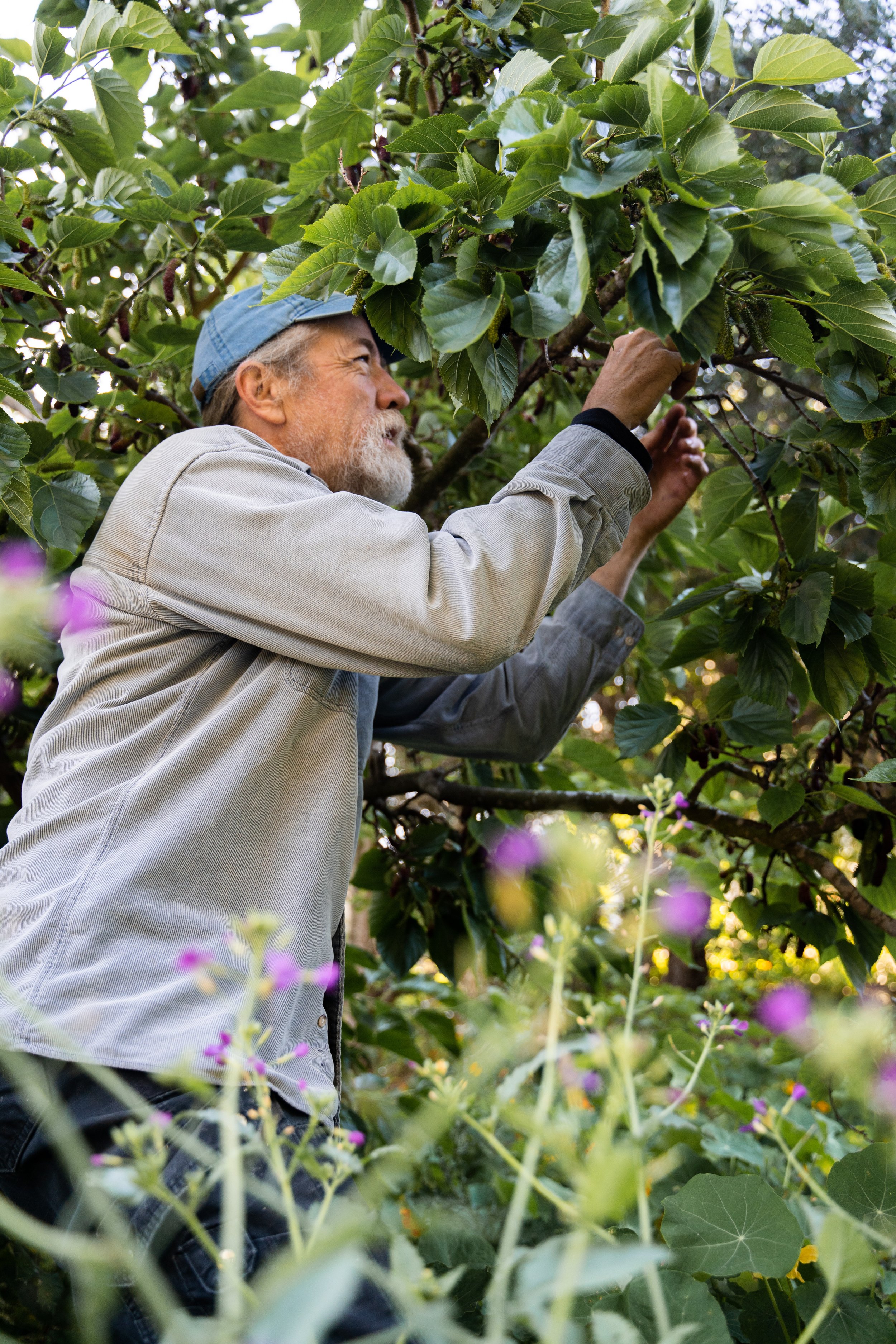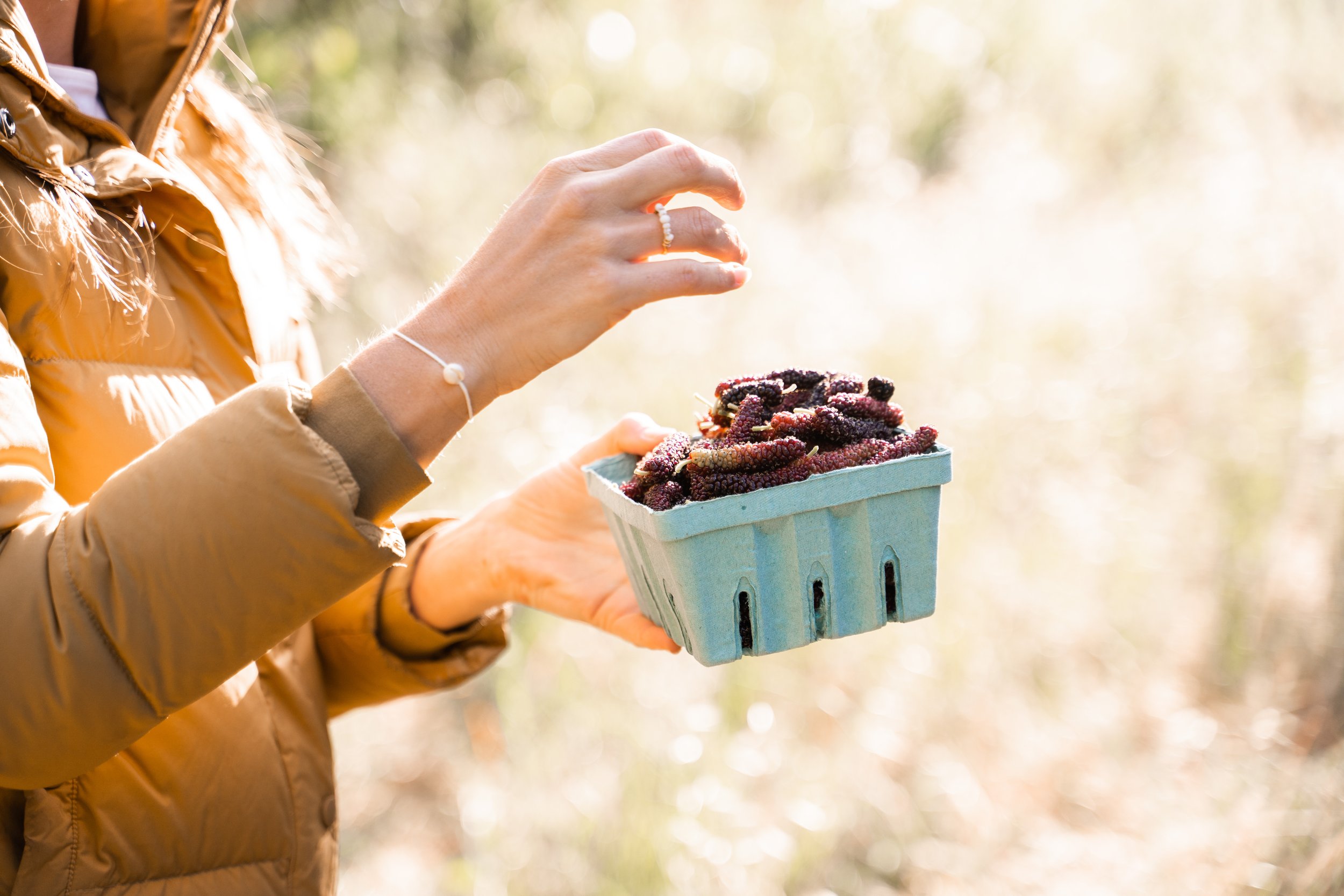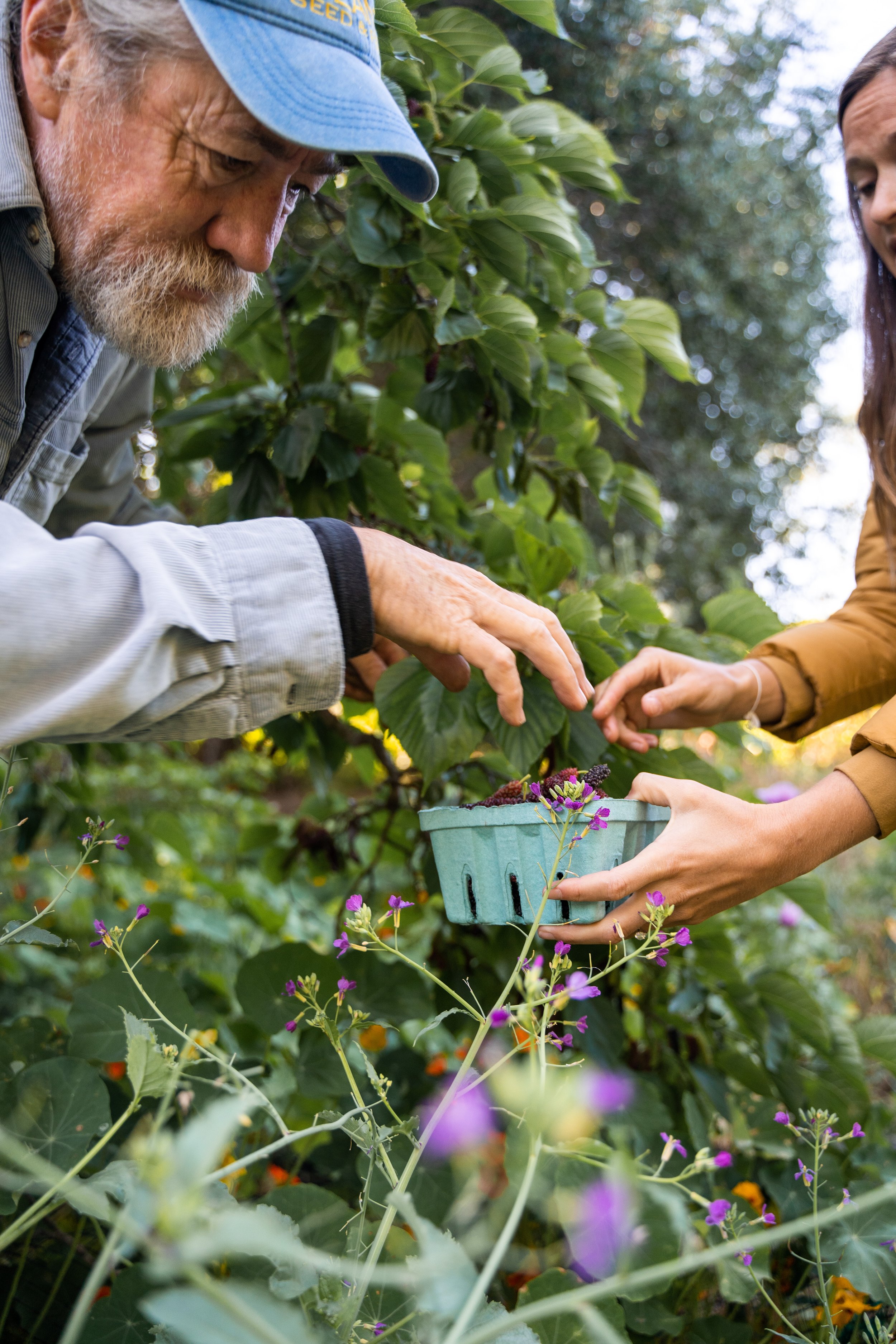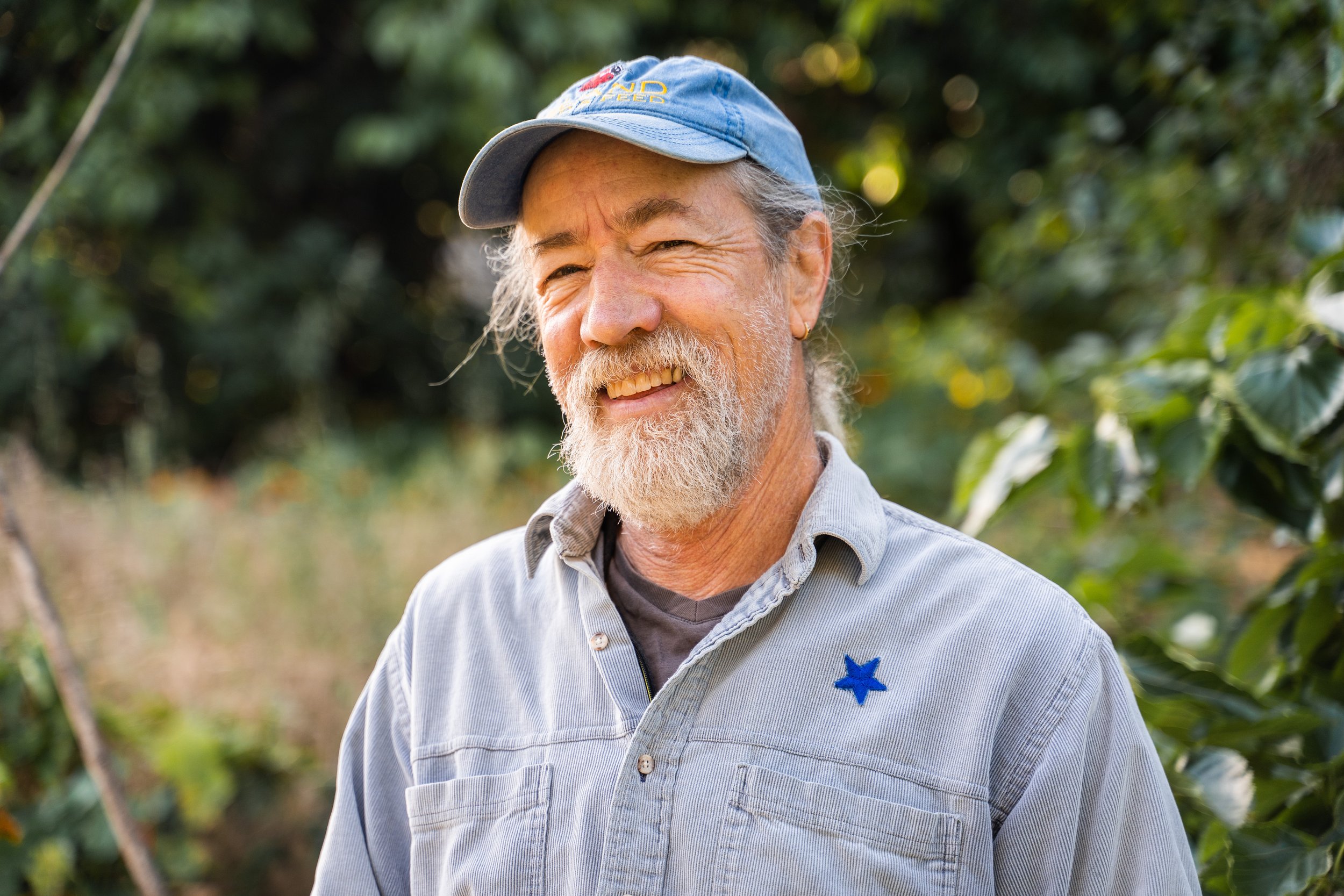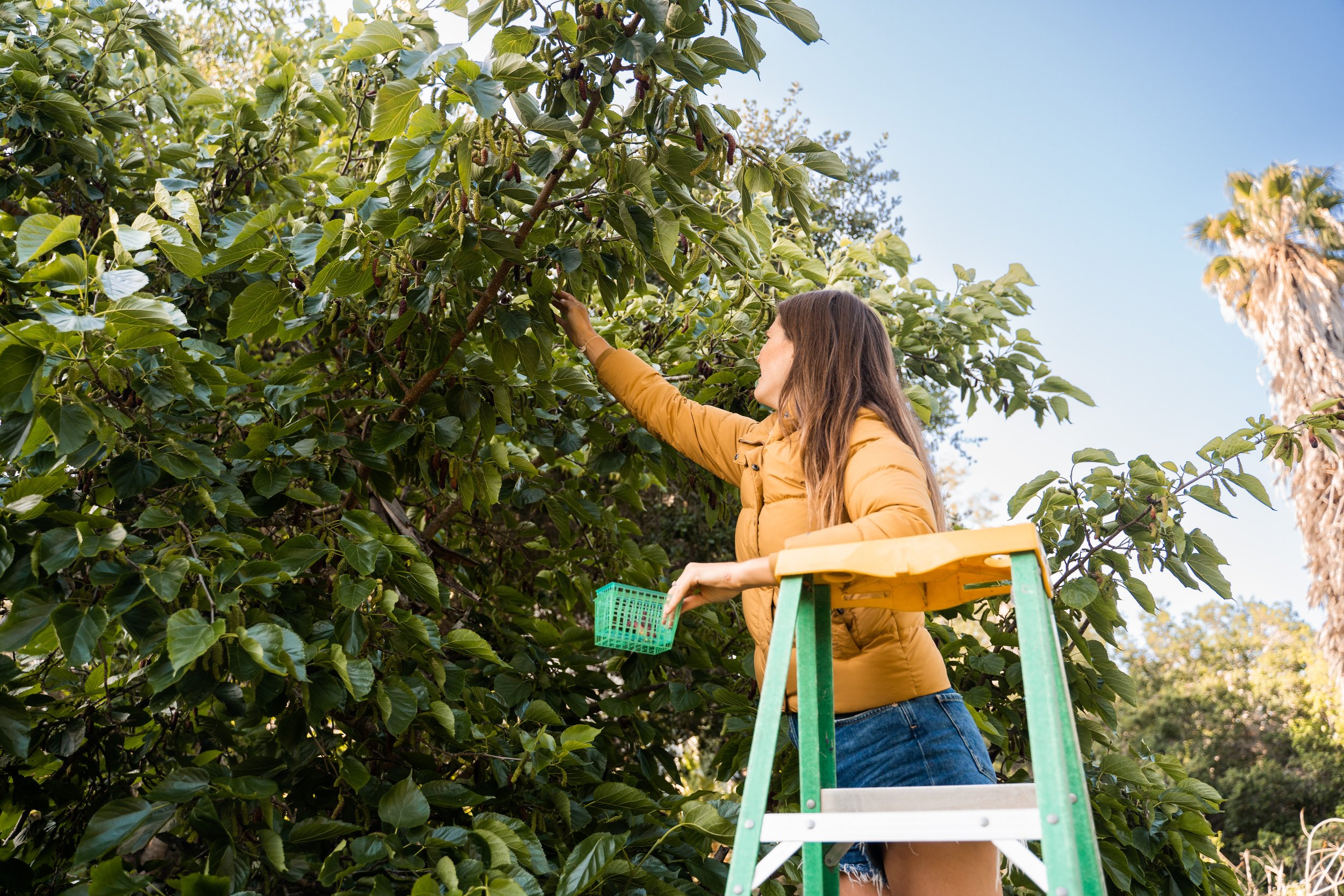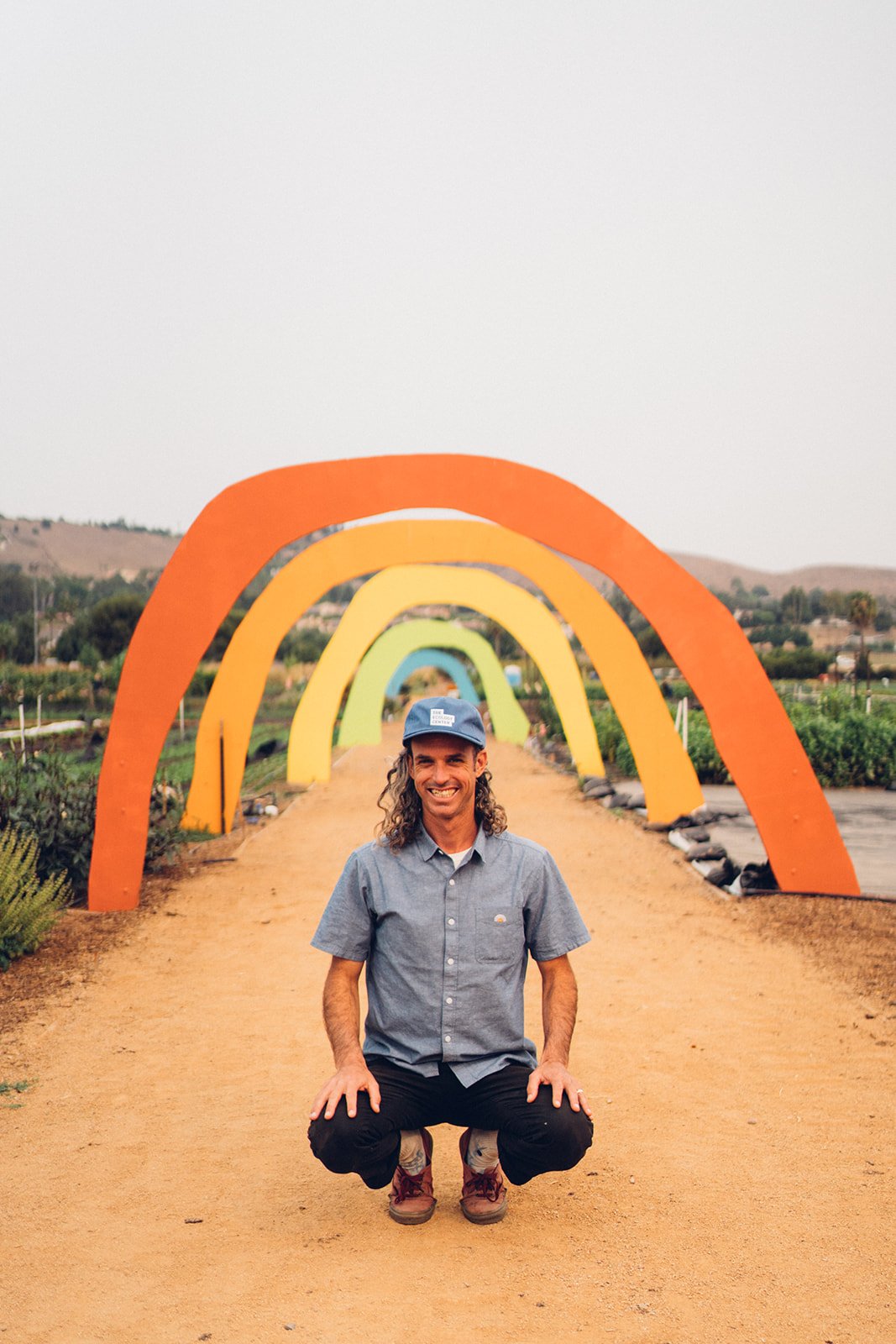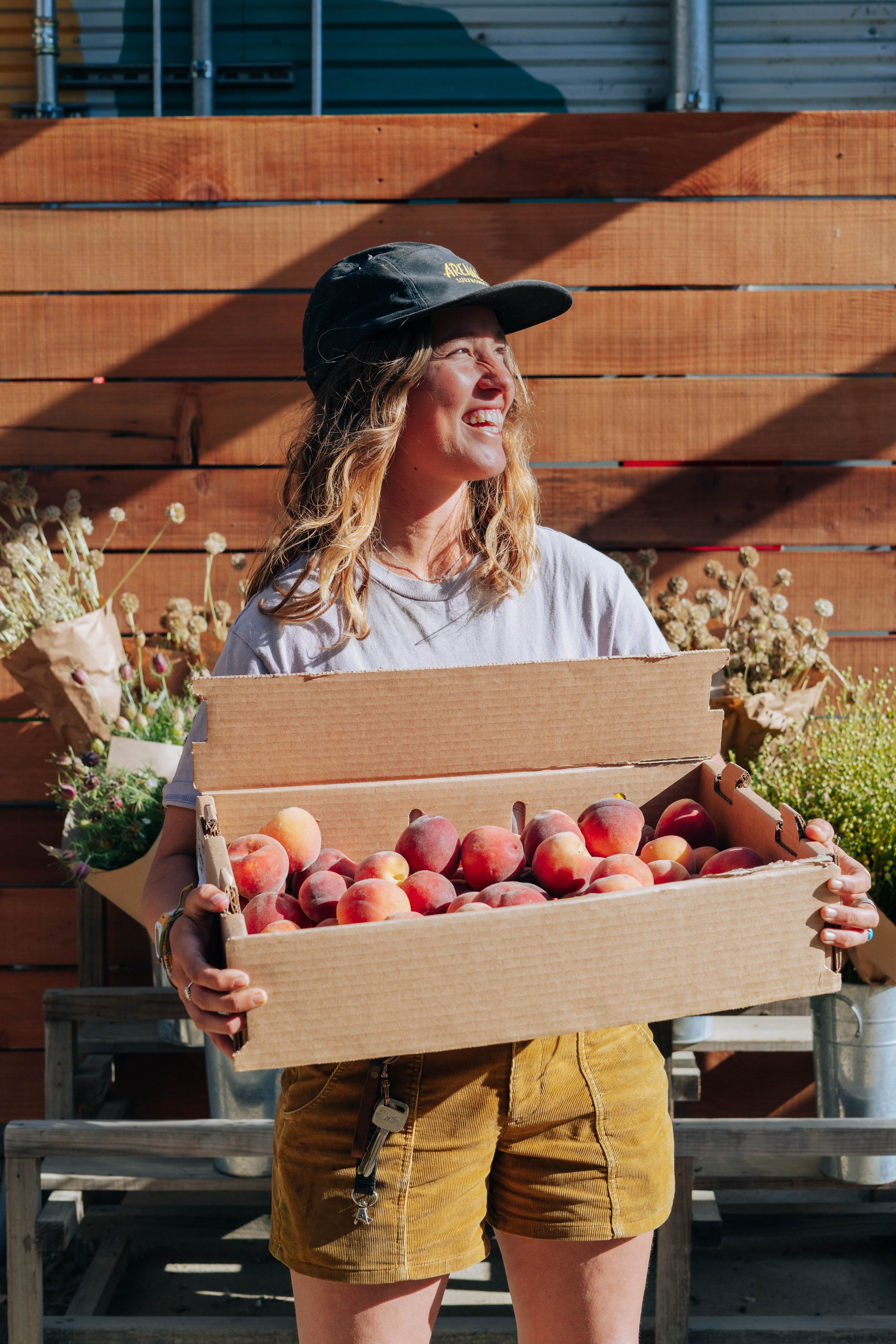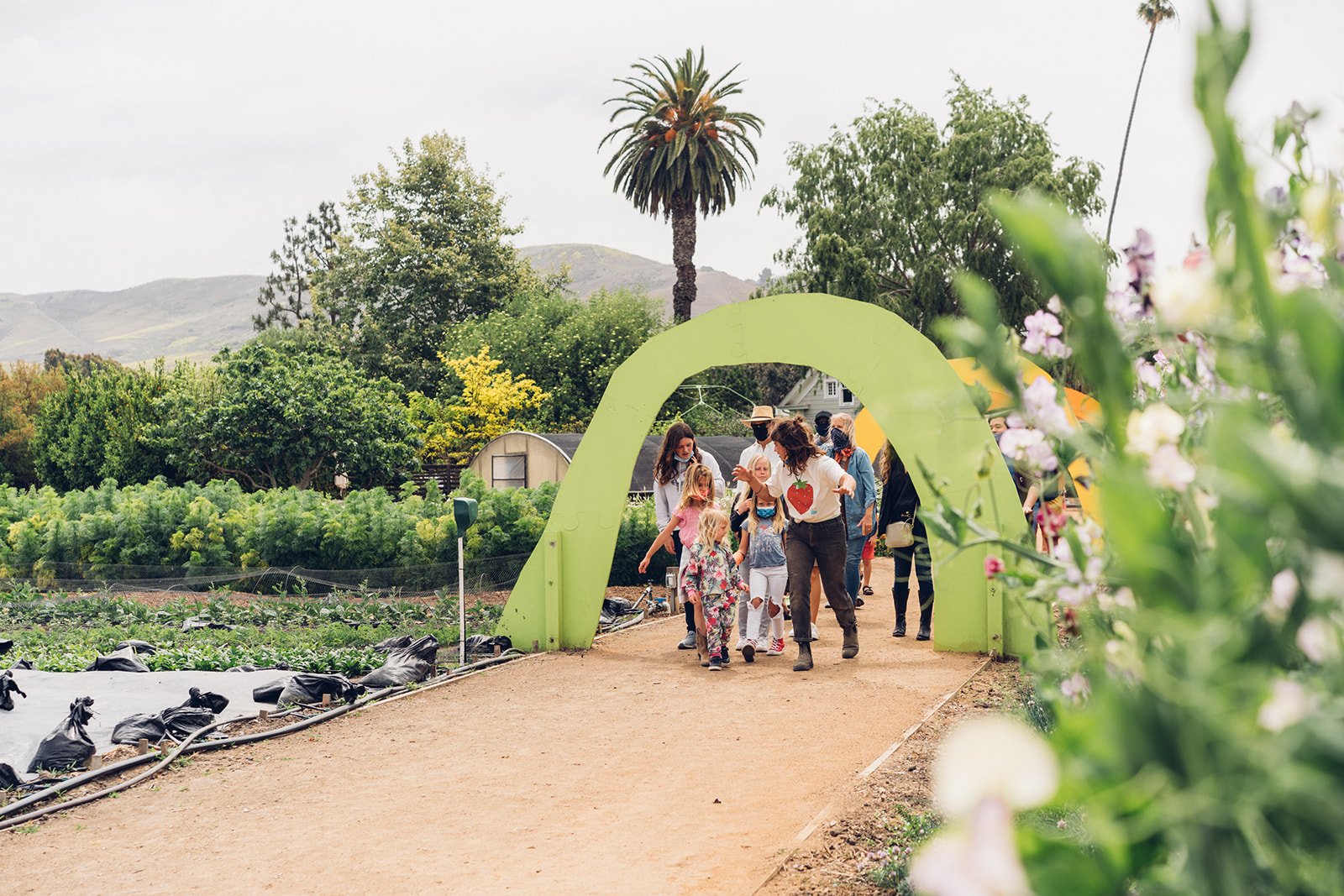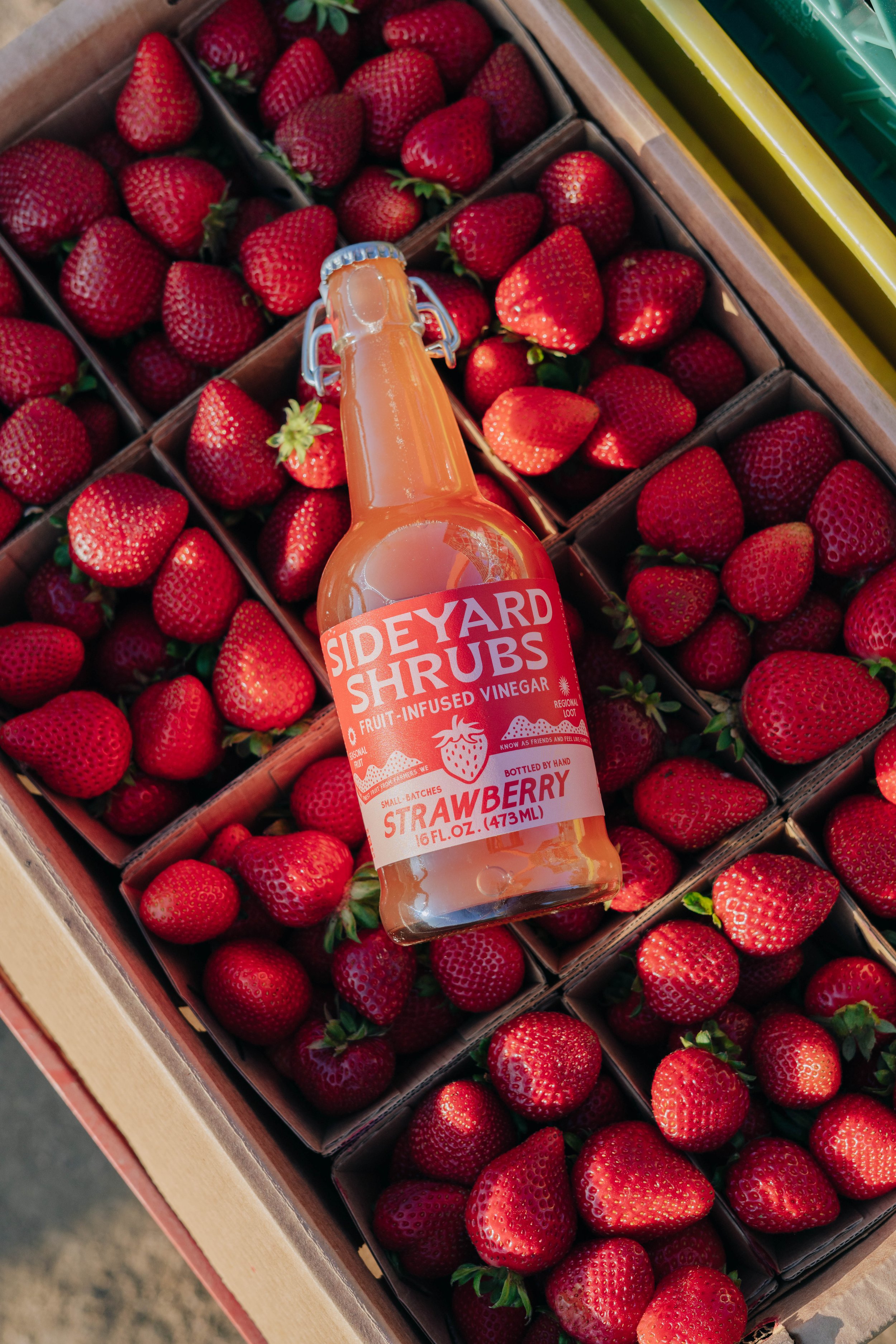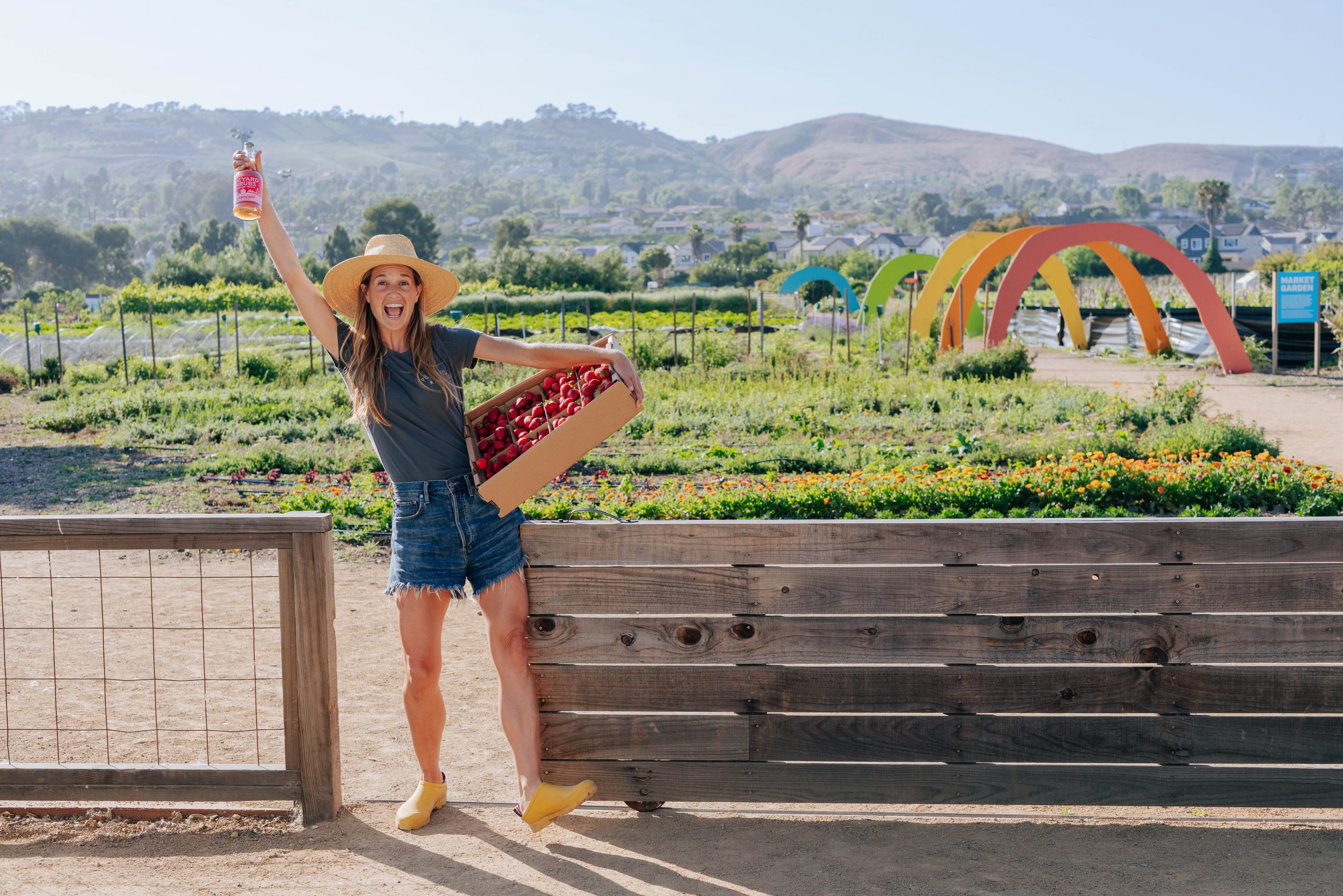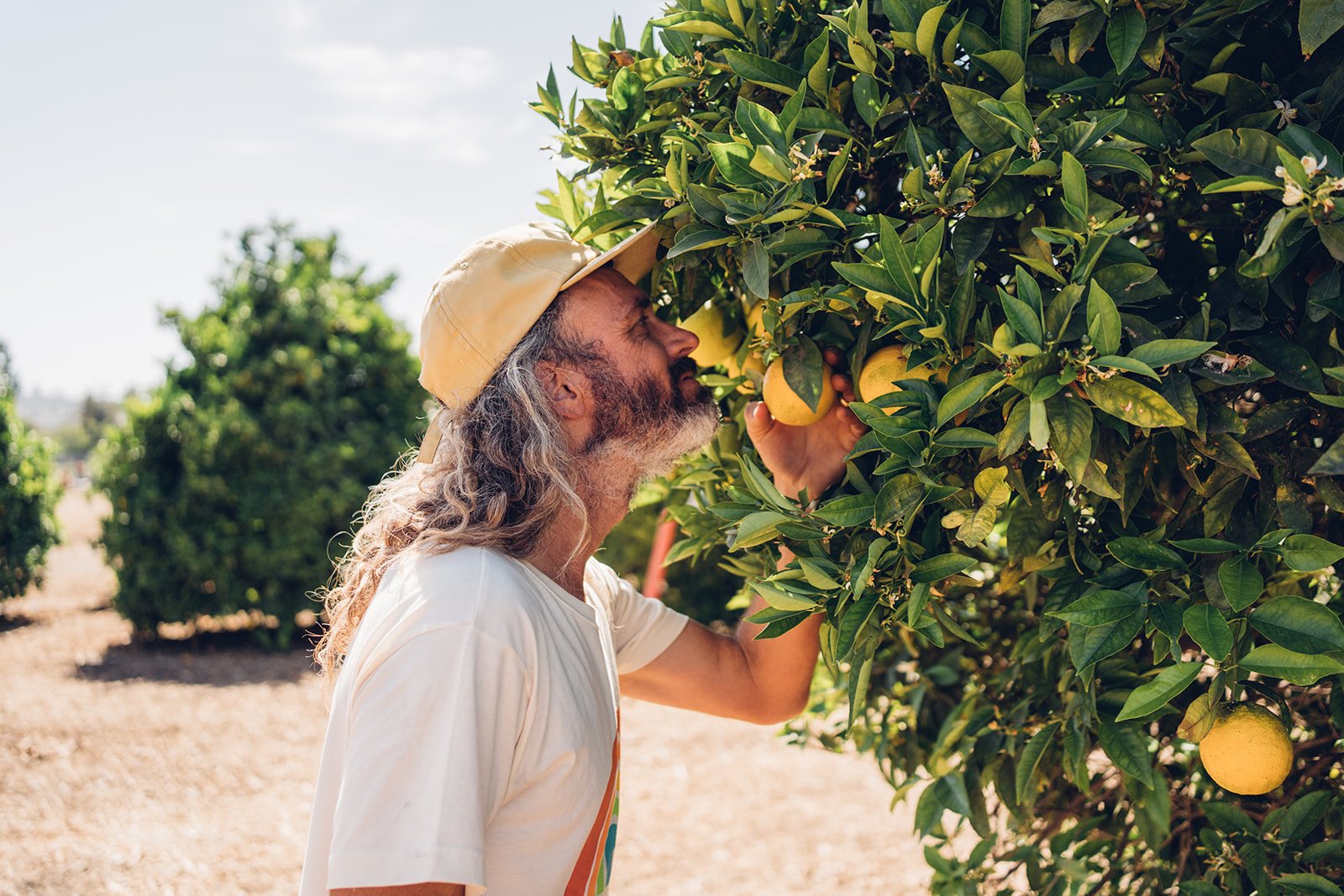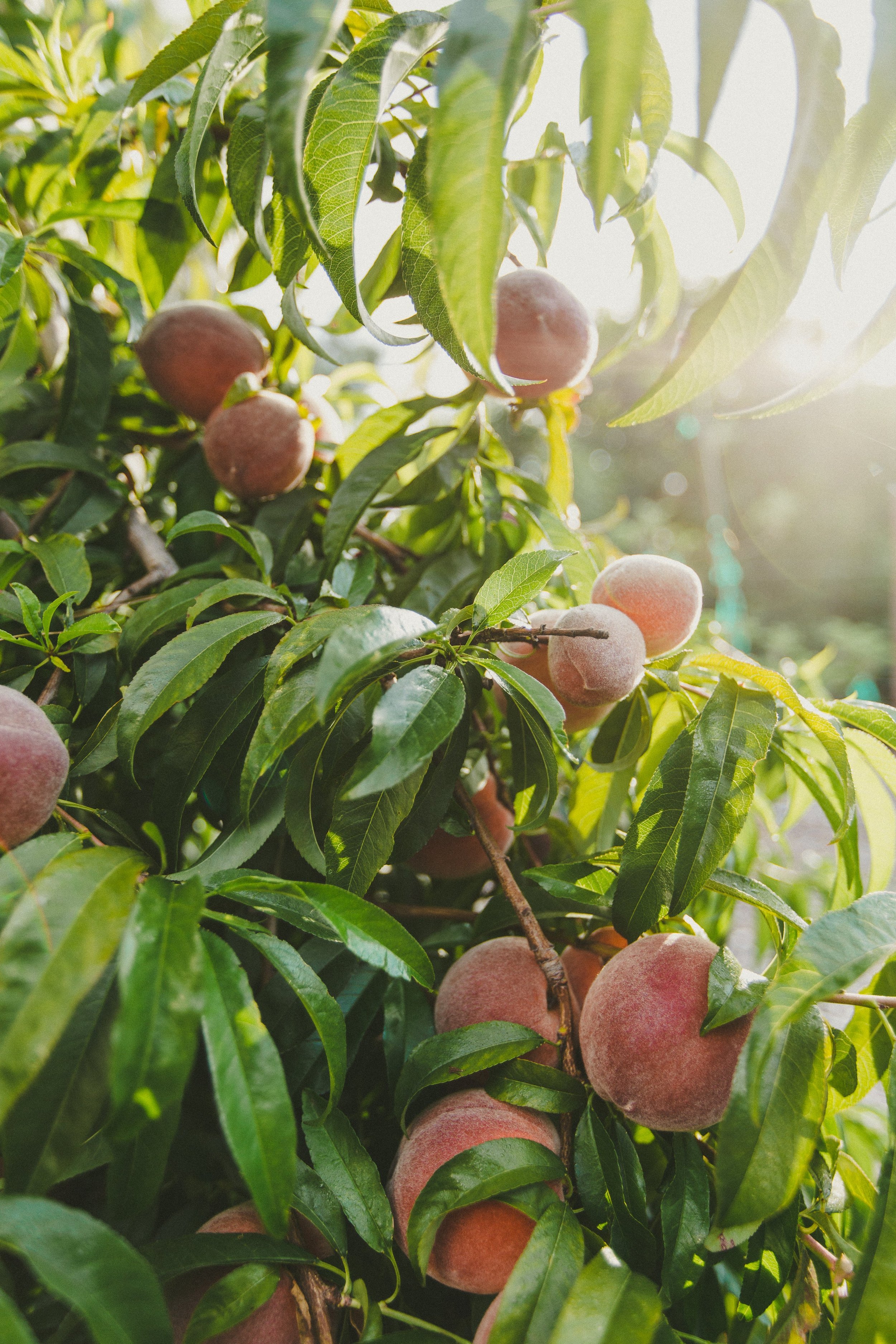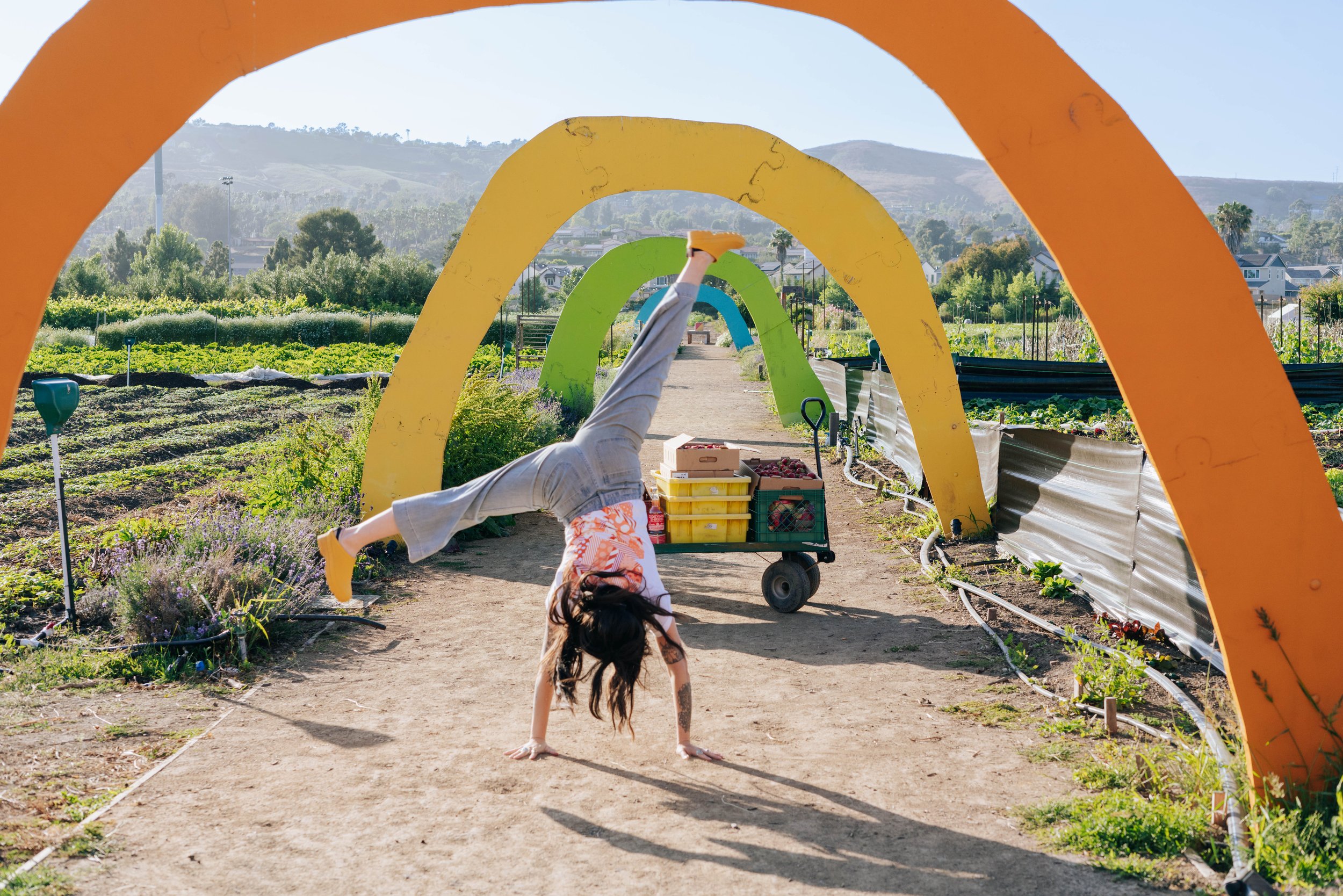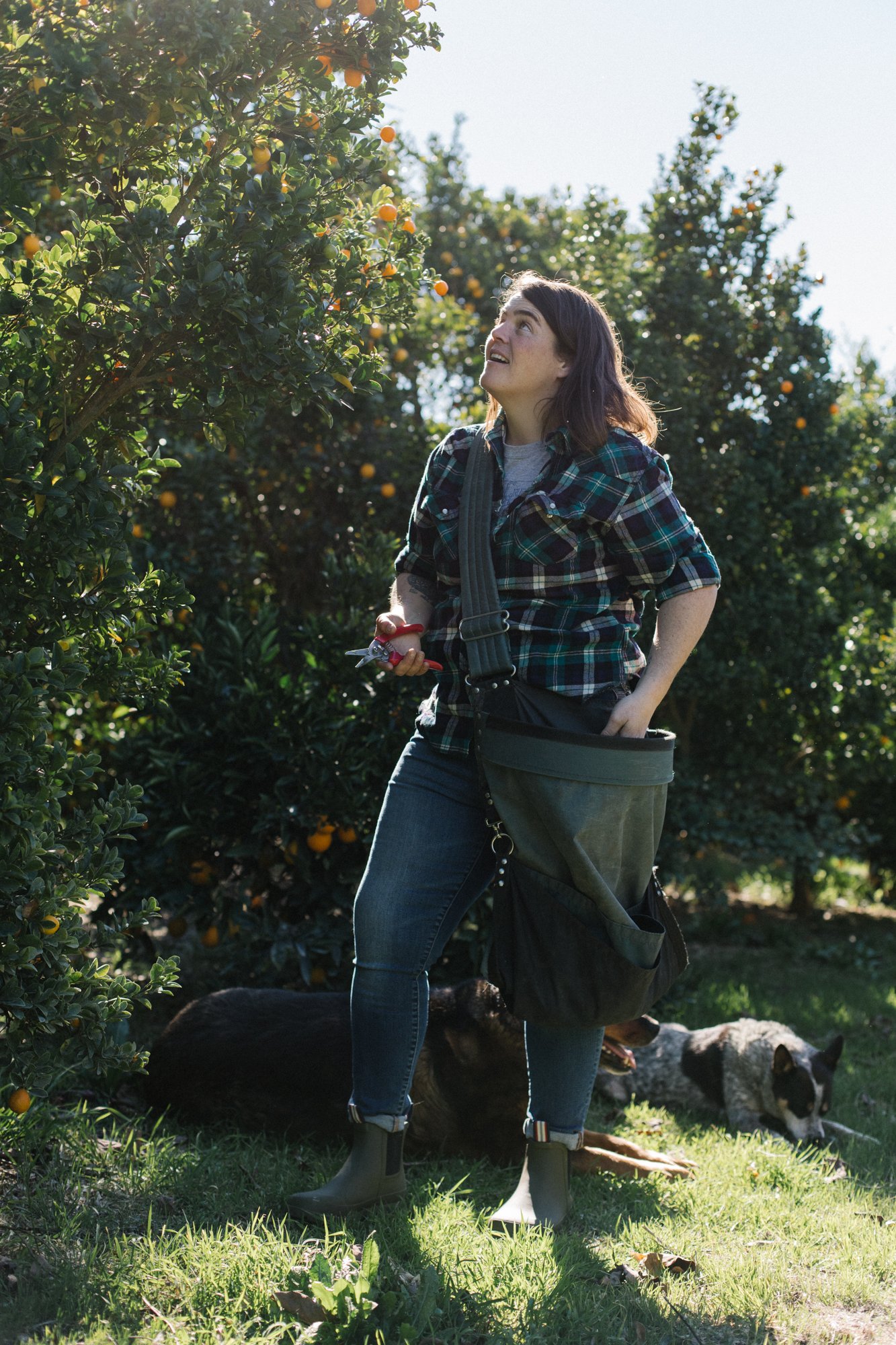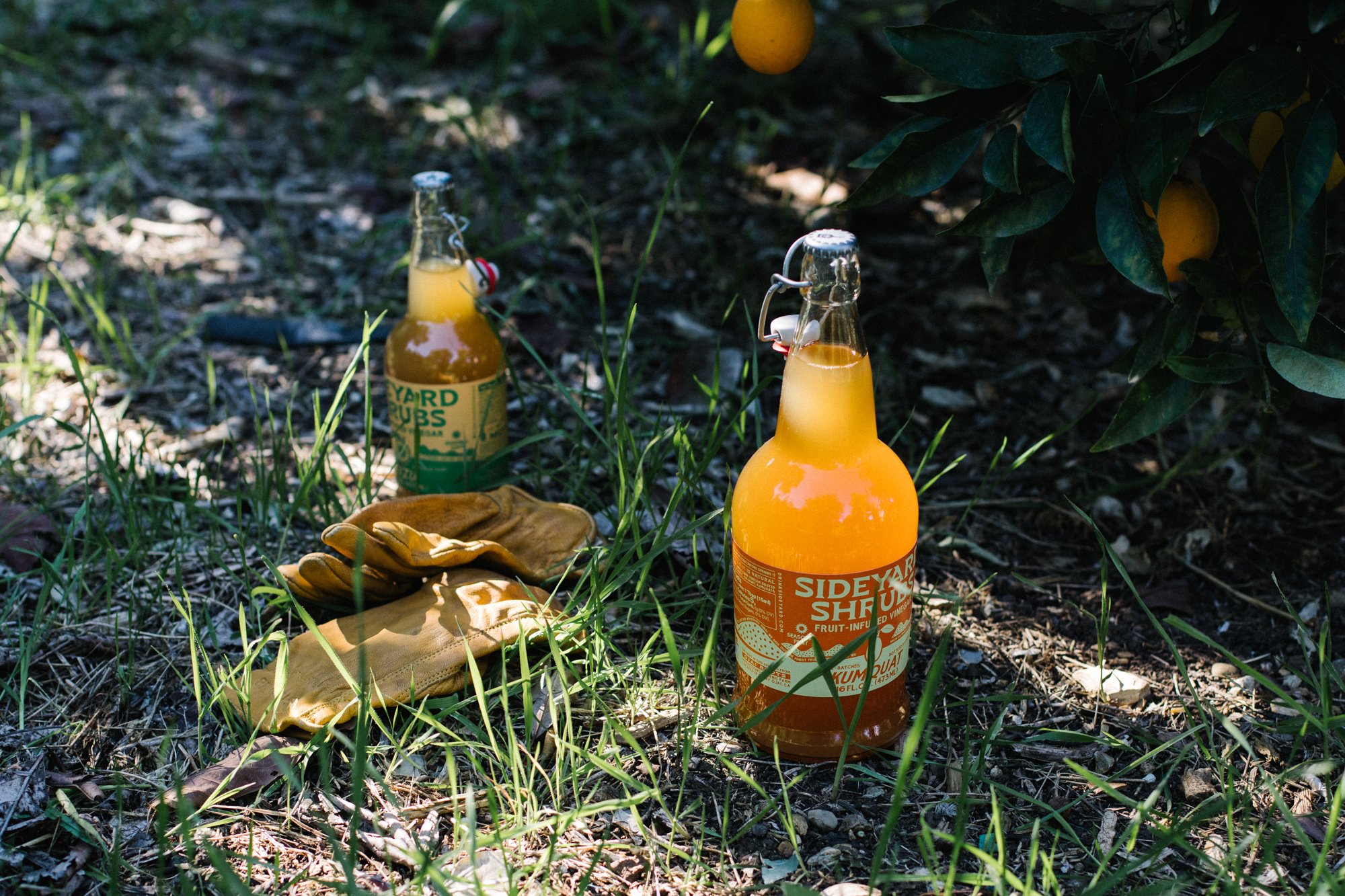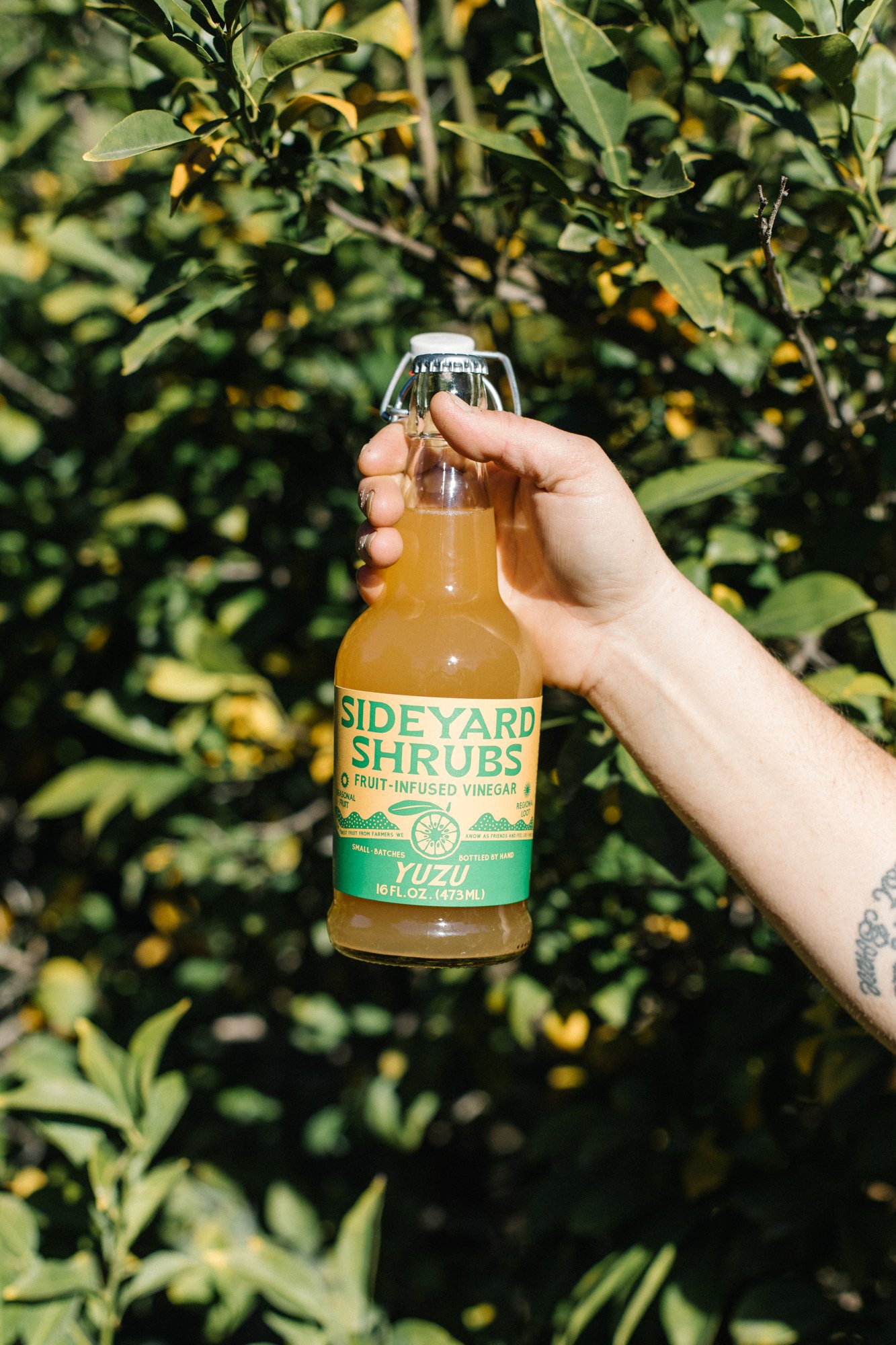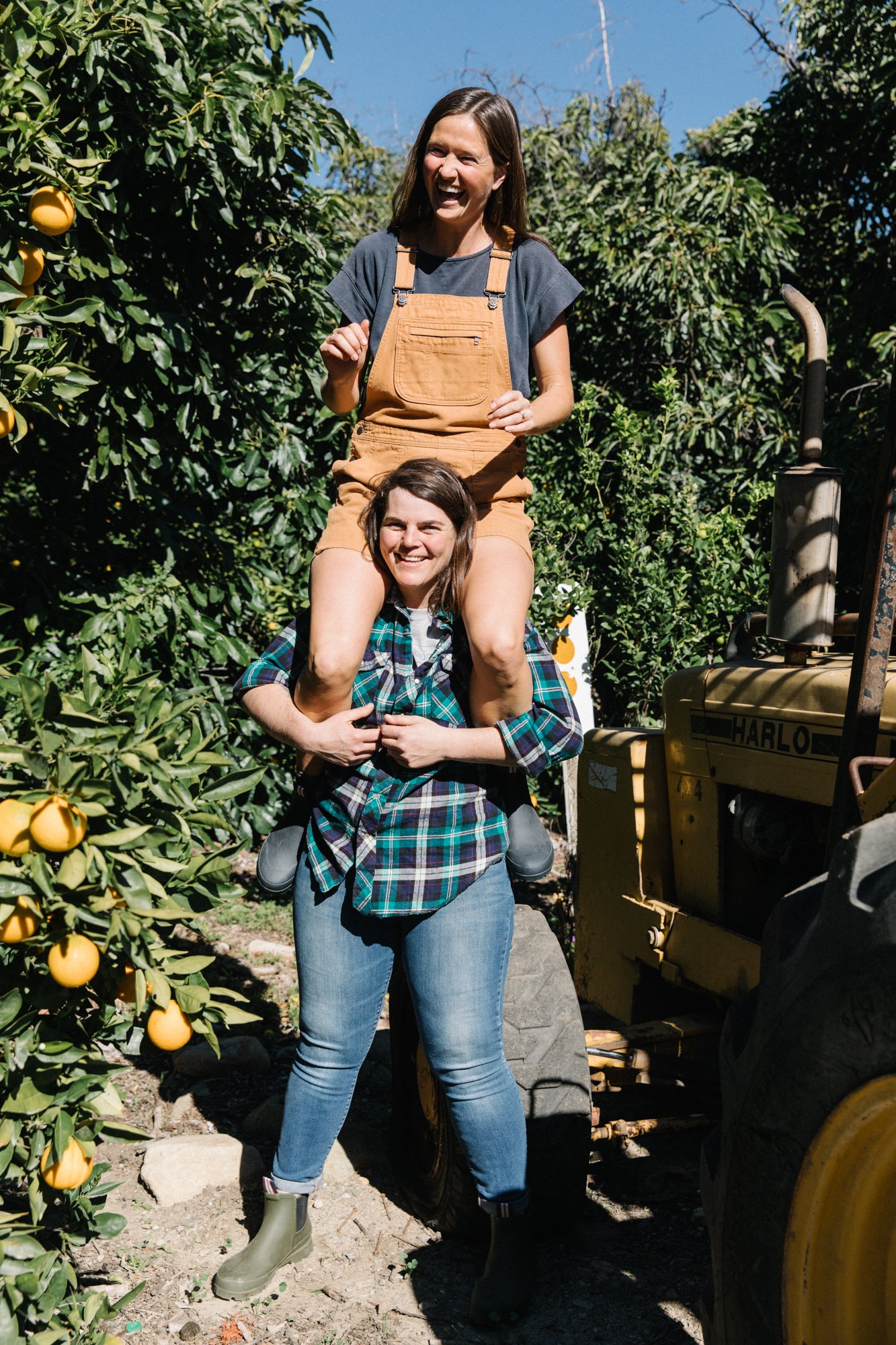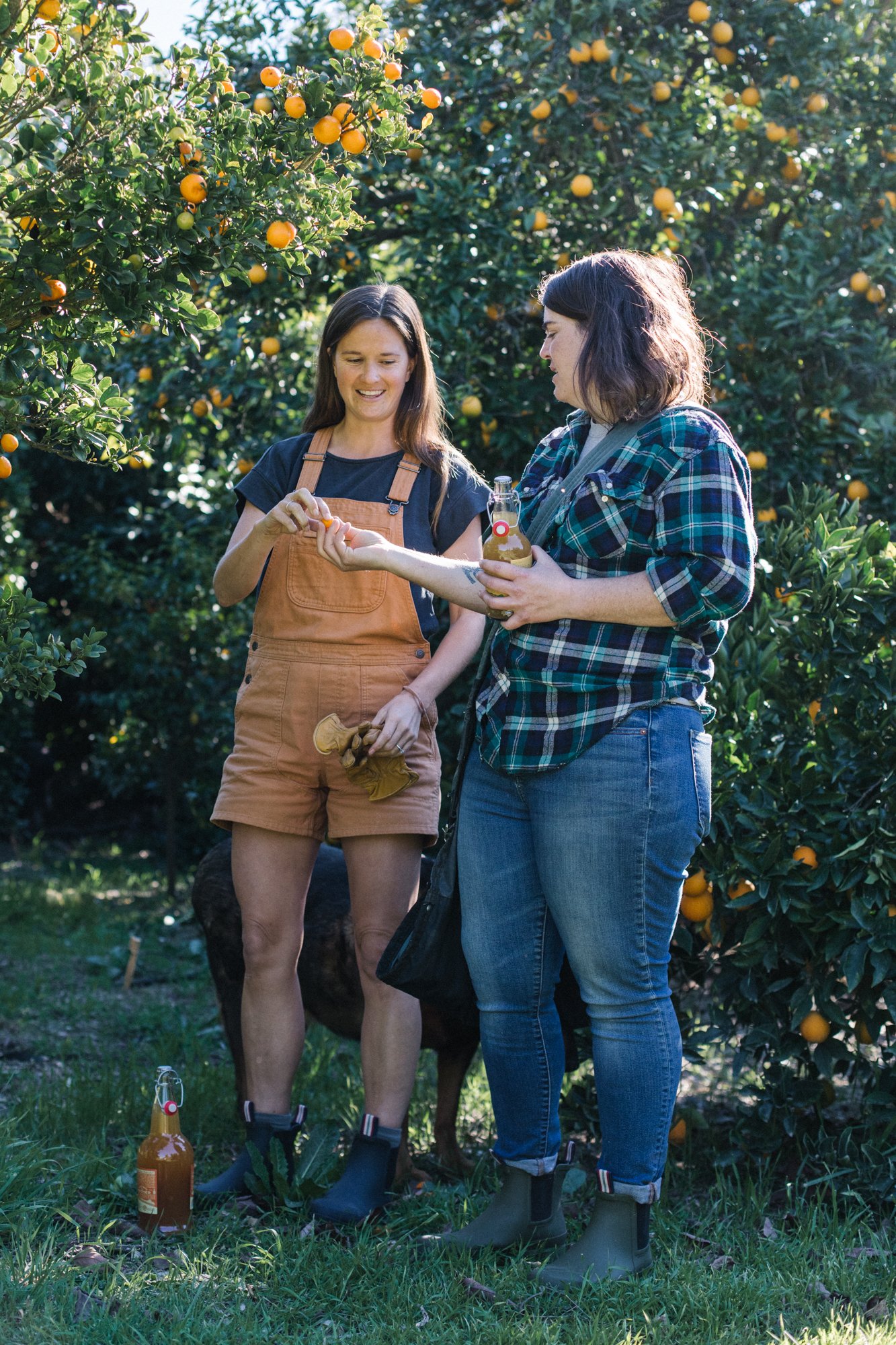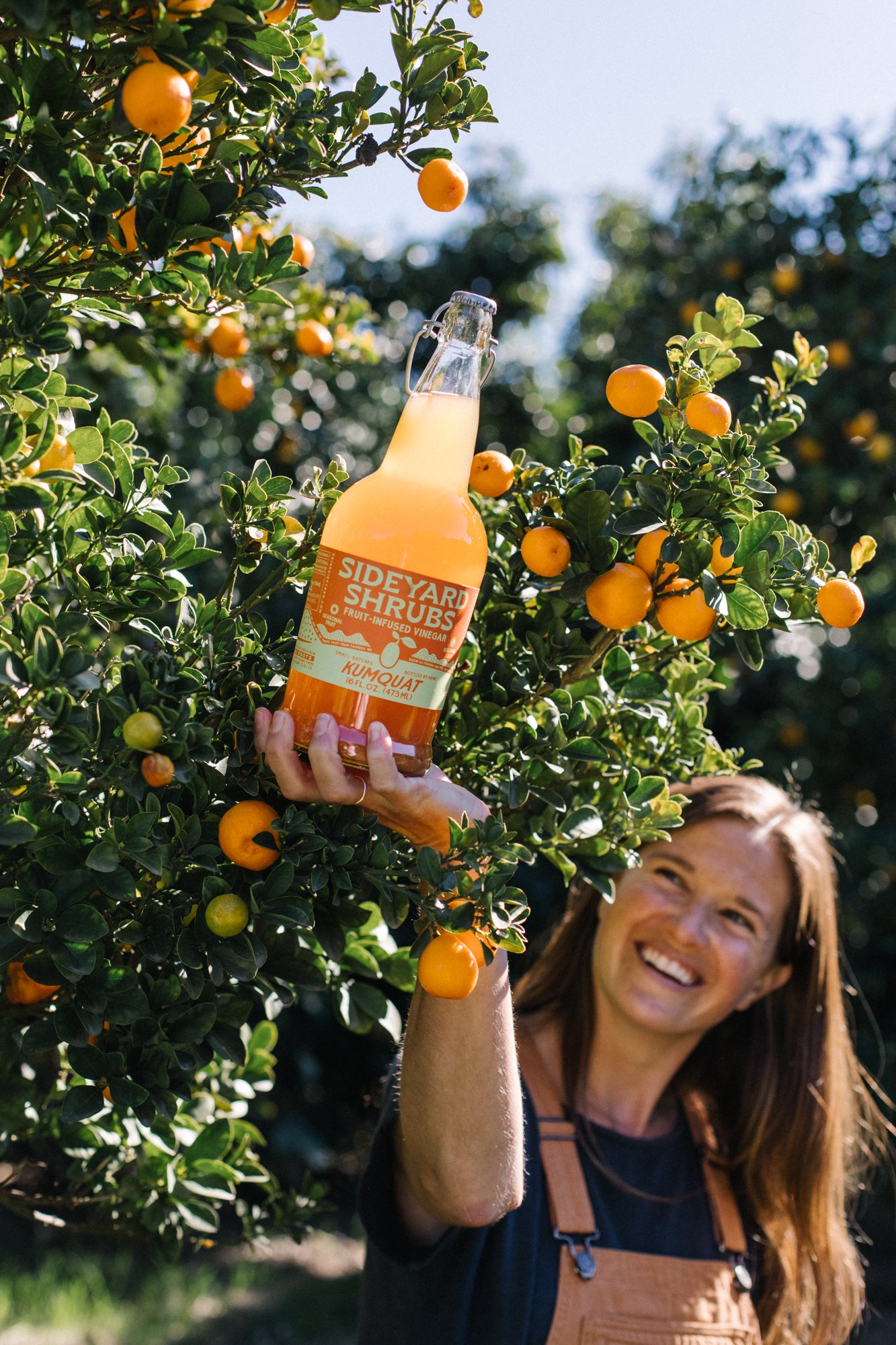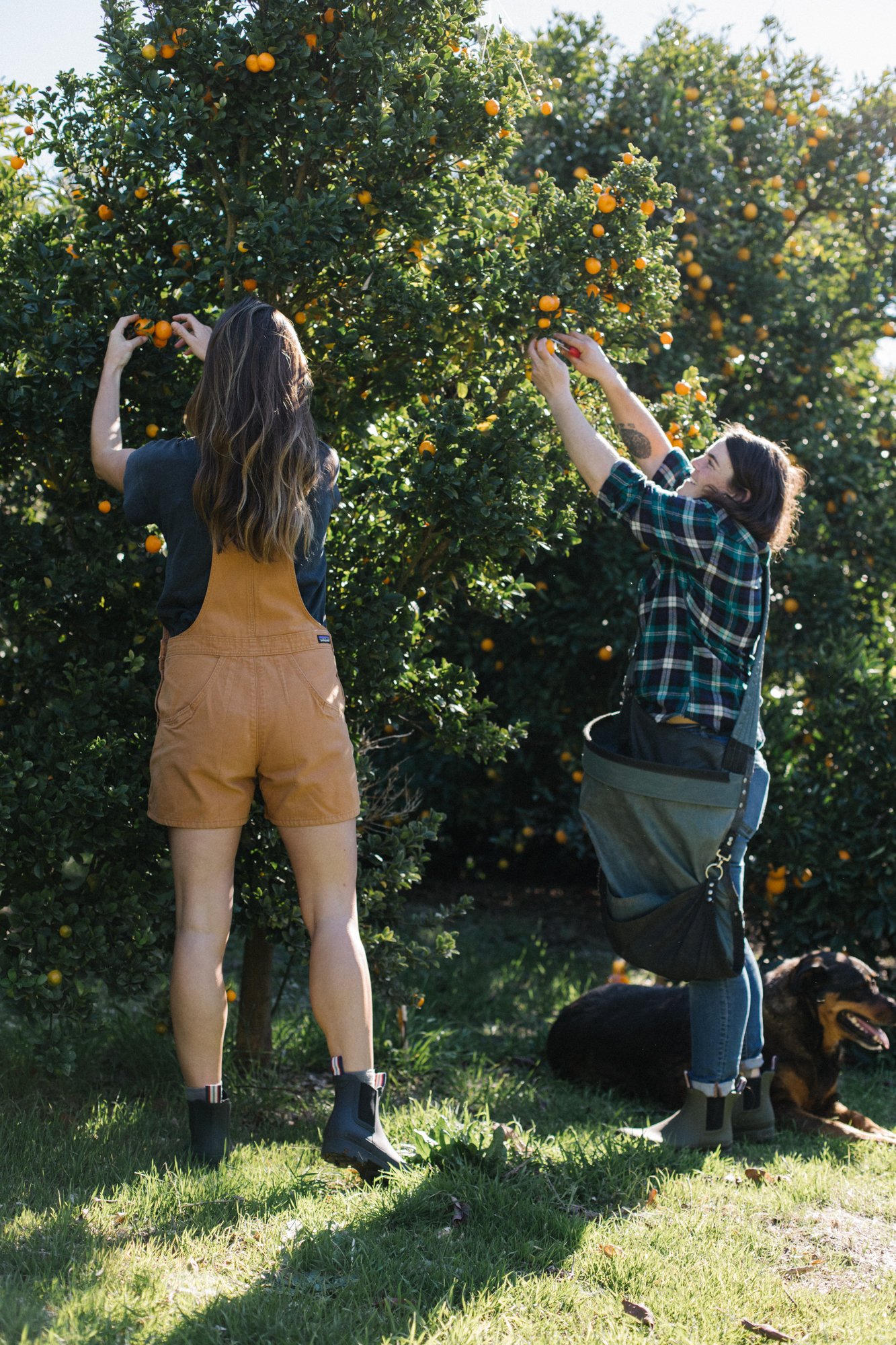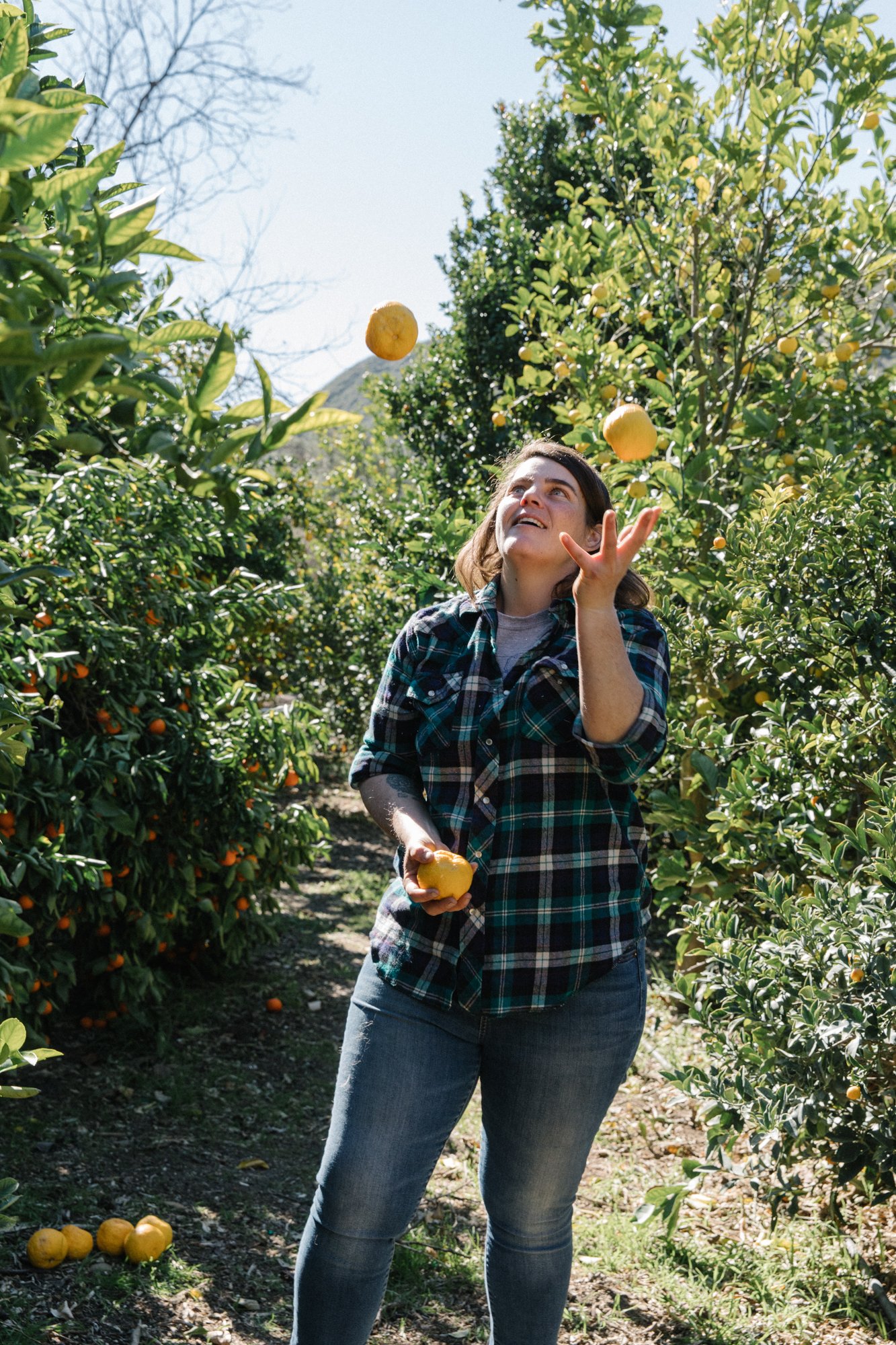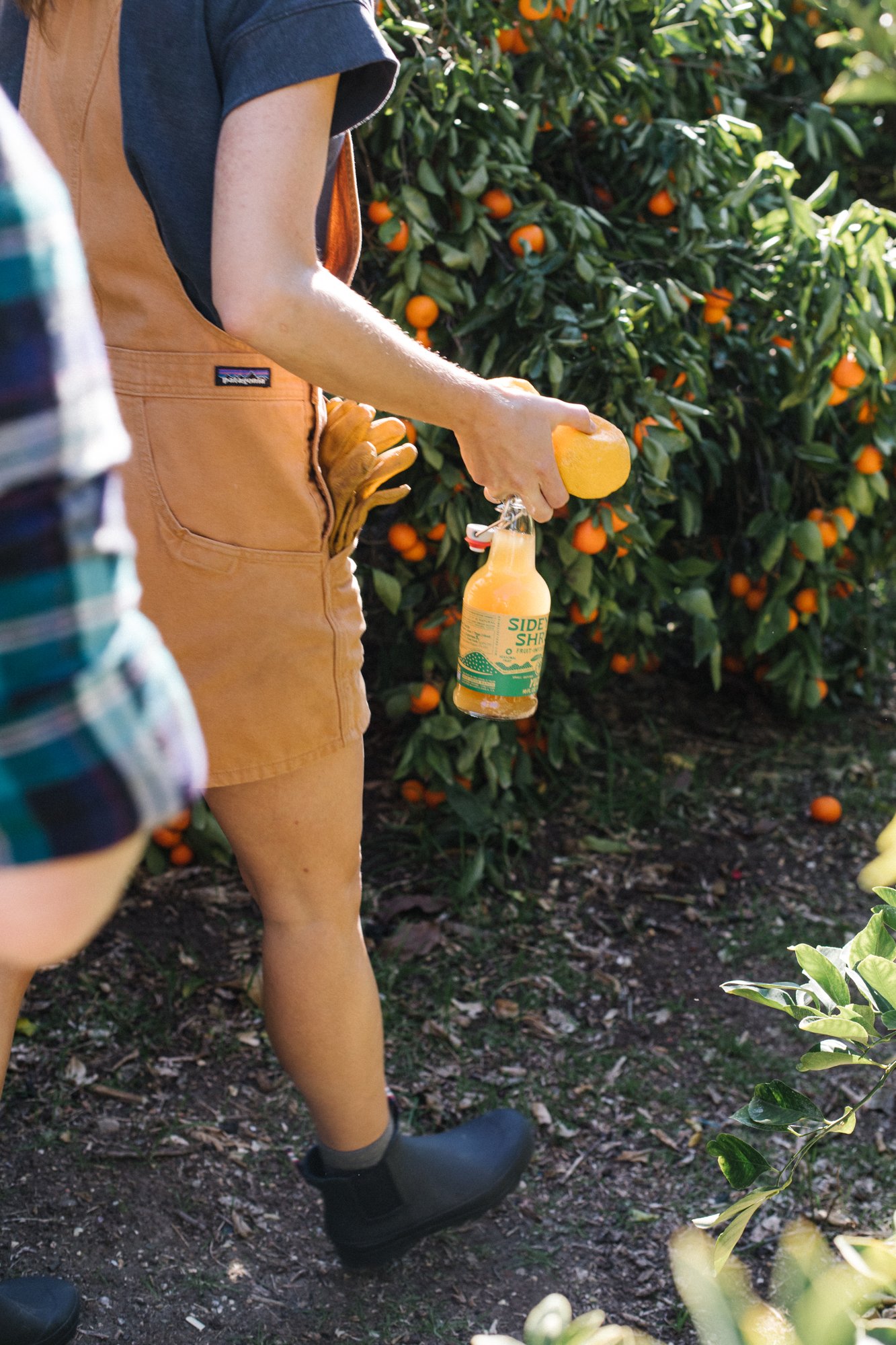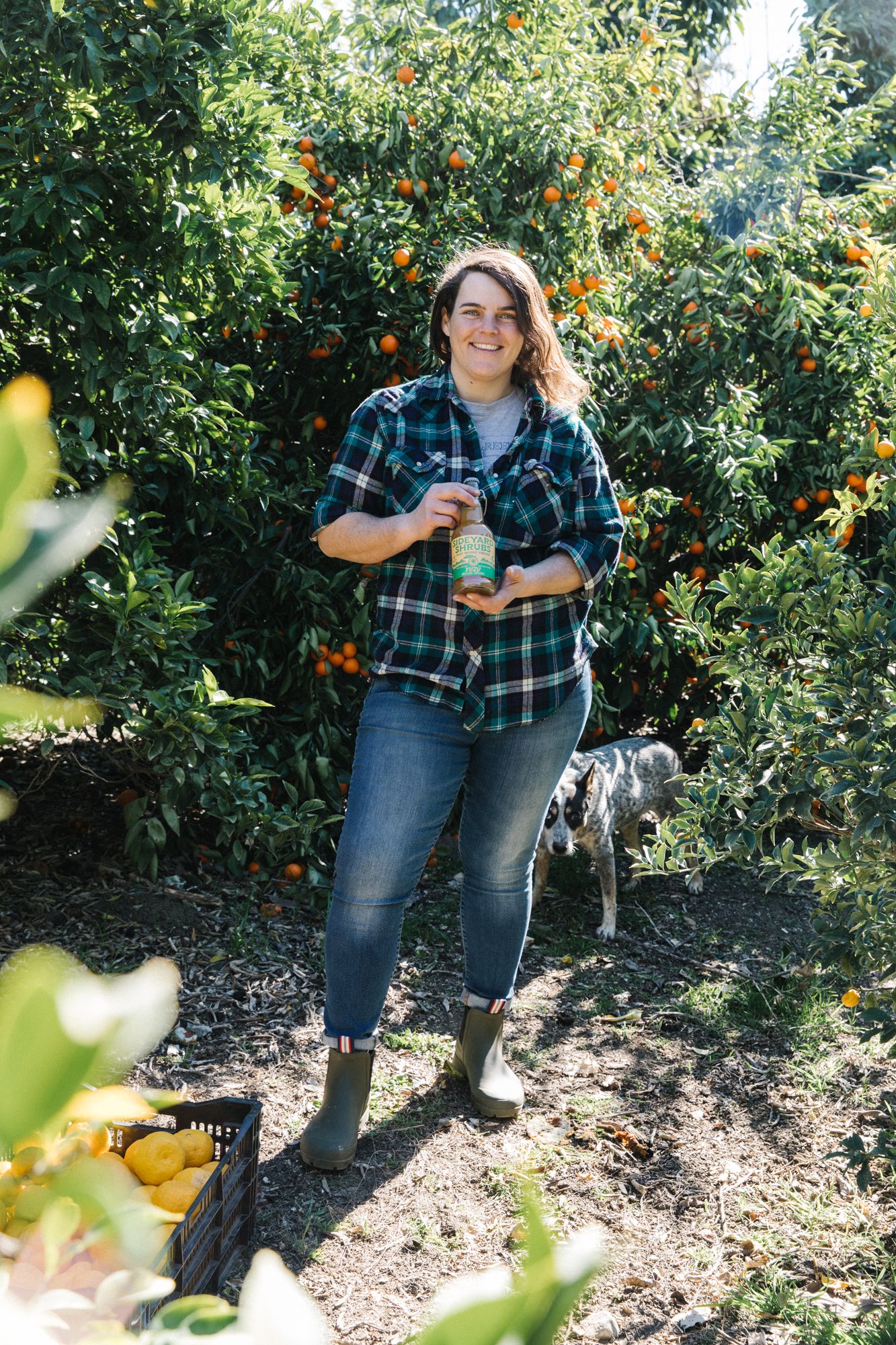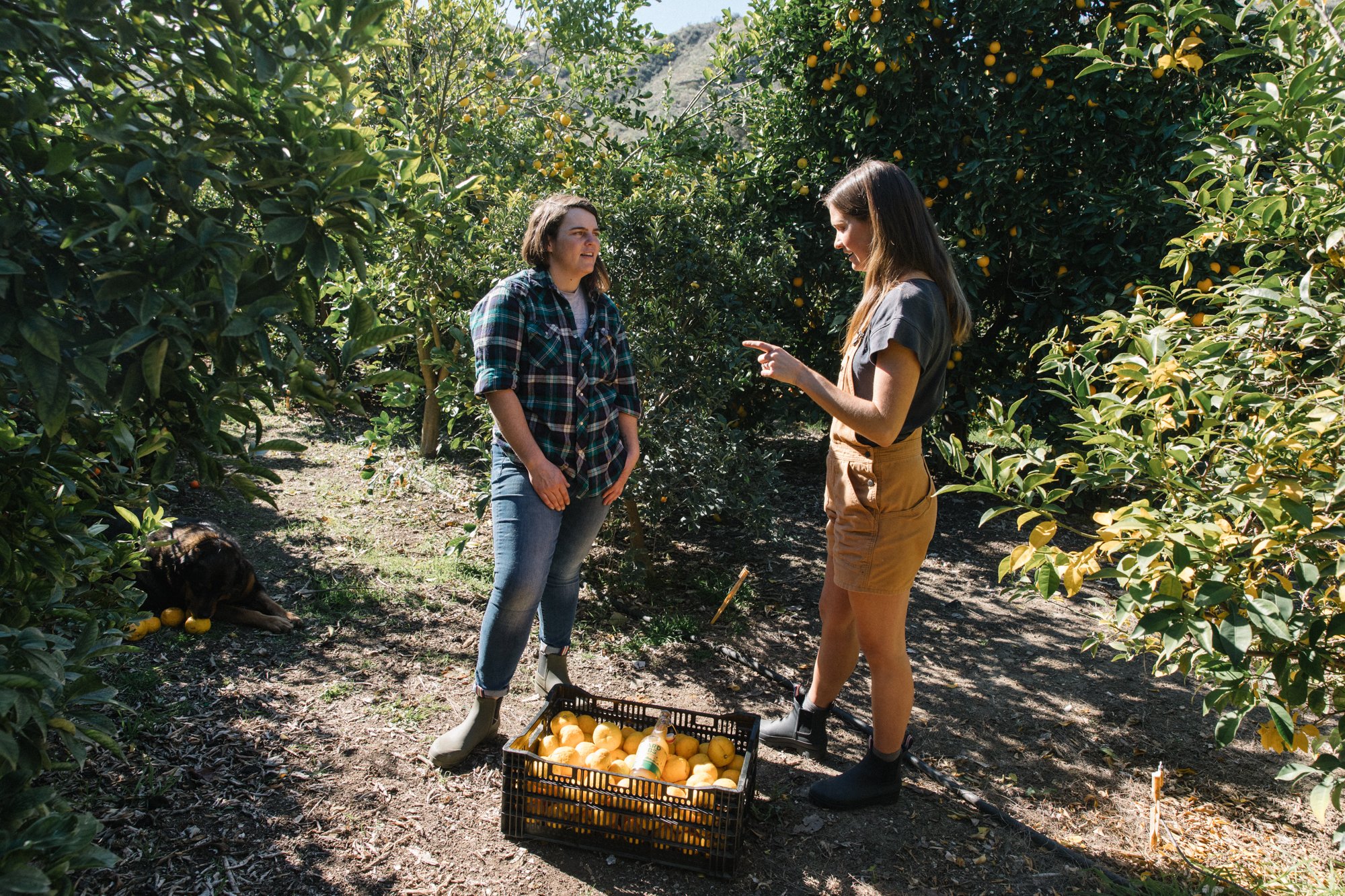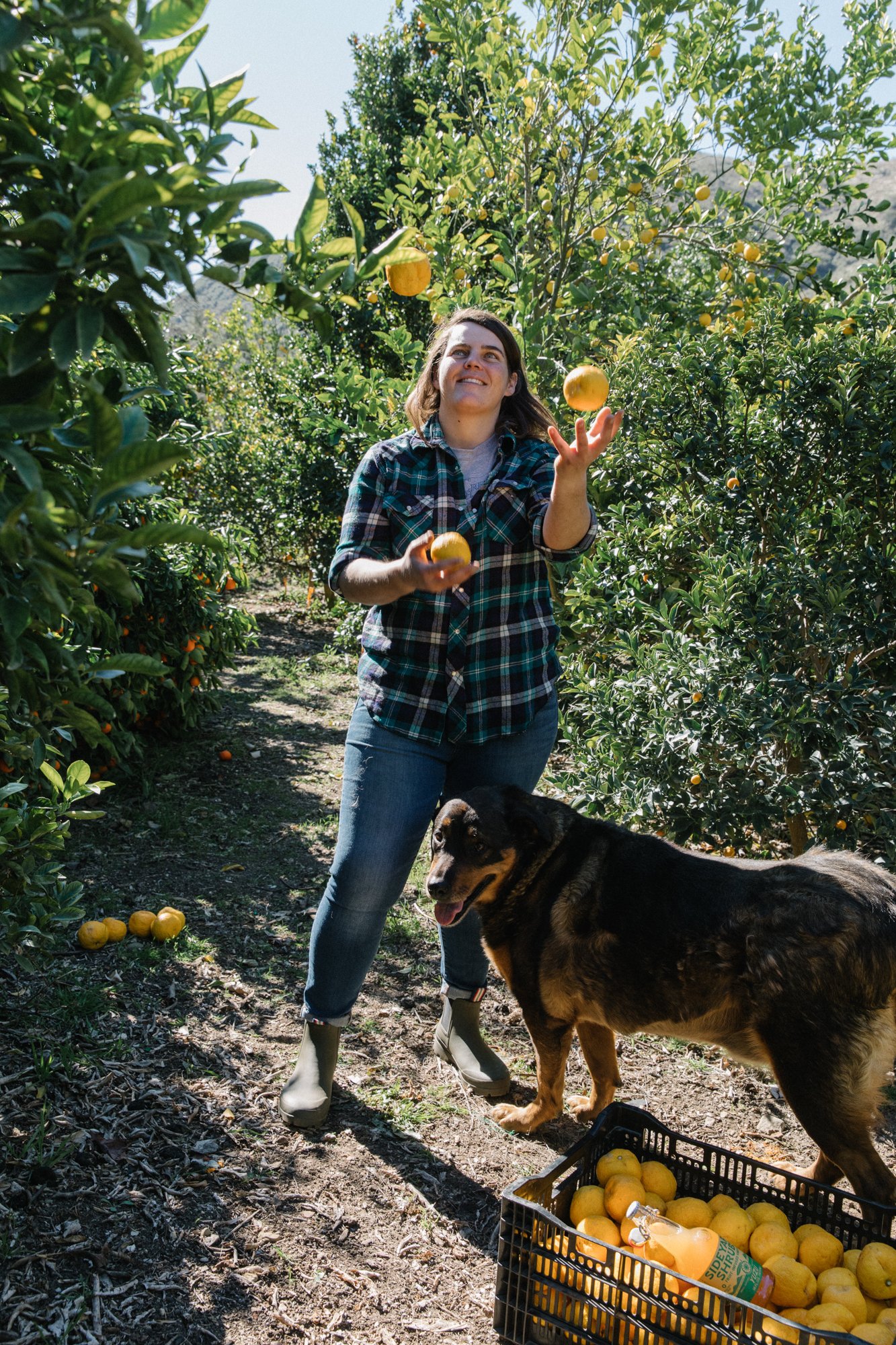
COME MEET OUR FARMER FRIENDS
The products we make and stories we share are meant to sing the praises of our farm partners, and the great work happening on small-scale farms. We believe strongly in building demand for regional food systems, regenerative farming practices and organic growers. It’s the people, places, and practices on these farms that makes Sideyard shine. We seek out the finest fruit from farmers we know as friends and feel like family.
Every bottle of Sideyard directly supports a small-scale, community-based, regionally-rooted farm. We’re exceedingly proud to celebrate the bounty and abundance of every growing season in Southern California.

Sideyard Farmer Spotlight: The Welch Family of Windrose Farm
Meet the Welch Family, party of six (seven, if you include the fluffy dog included in the above portrait, and even bigger if you count the sheep and chickens). This outstanding farm family grew the fantastic plums in our Sideyard Plum Fruit-Infused Vinegar (ACV).
Farming is a labor of love for all six members of the Welch Family.
SIDEYARD FARMER SPOTLIGHT:
Welch Family, Windrose Farm
Meet the Welch Family, party of six (seven, if you include the fluffy dog included in the above portrait, and even bigger if you count the sheep and chickens). This outstanding farm family grew the fantastic plums in our Sideyard Plum Fruit-Infused Vinegar (ACV).
Farming is a labor of love for all six members of the Welch Family.
As regenerative farmers, ranchers and parents of four phenomenal kids, Catherine and Justin Welch are working hard all year long, showing us how to keep small farms alive and strong and training up the next generation of young agrarians to grow their own.
Tucked away in rolling foothills on a 50-acre stretch of countryside property in the Central Coast of California, Windrose Farm is a sustainable, regenerative and diversified-organic biodynamic family farm in Paso Robles. Here, the heat of the beaming sun in the spring and summer growing seasons turns the hills golden brown; the landscape is breathtakingly beautiful, all year long.
The Welch Family purchased Windrose Farm in the fall of 2020 from a farm family, Barbara and Bill Spencer, that pioneered small farming for over three decades and became mentors to Catherine and Justin in biodynamic agriculture practices.
Since the farm property changed hands and the Welches took over, Windrose Farm continues the farm’s legacy in regenerative agriculture and organic practices: the biodynamic calendar dictates when they seed crops on this diversified farm, compost is produced on the property, animals are humanely raised and rotationally grazed, and soil health is of the utmost importance.
We proudly source an abundance of peak season SANTA ROSA PLUMS from Windrose Farm. We’ve known and worked with the Welch Family for as long as we’ve been in business, and we can’t stay away. This family of growers, and the farm property, produces some of the best tasting plums we’ve ever tasted.
At Sideyard, we’re proud to work with farmers we know as friends and feel like family – the smallholders we work with are the real deal! They’re growing the good stuff, taking care of the land, and supporting our regional food system in Southern California.
We can’t pass up an occasion to sing the highest praises for Windrose Farm. Thank you, Welch Family, for supporting our small business and doing the Sideyard dance with us! We’re grateful for your continued friendship and partnership. The future is abundant, thanks to smallholder farmers like Catherine, Justin, Lauren, Natalie, Aiden and Bubba. Keep growing the good stuff!!!
Photo credit: Feast your eyes on these beautiful photos, by Colette Krey. Among her many talents, Colette is our friend, photographer and community village member at Sideyard.
Sideyard Farmer Spotlight: Matt Buckmaster
Nestled in a neighborhood community at the base of the foothills of Santa Barbara County, Morning Star Sideyard Farm is an ecological oasis of fruit trees and homegrown gardening.
SIDEYARD FARMER SPOTLIGHT: Matt Buckmaster, Morning Star Sideyard Farm
At Sideyard, we’re proud to work with farmers we know as friends and feel like family – and our ‘sideyard’ farm partners are the real deal! They’re growing the good stuff, taking care of the land, and supporting our regional food system in Southern California.
We’re equally proud to extend the short, fleeting seasons of fruits like mulberries with our fruit-infused vinegars.
Nestled in a neighborhood community at the base of the foothills of Santa Barbara County, Morning Star Sideyard Farm is an ecological oasis of fruit trees and homegrown gardening.
Owned by our friend and farmer, Matt Buckmaster, and lovingly named after Matt’s late mother-in-law, Morning Star Sideyard Farm is located in Goleta, California and has one mulberry tree that explodes with fruit every summer.
This summer season, back in mid-June, we harvested mulberries by hand from Morning Star. When it came time, the fruit on Matt’s tree was bursting with flavor and ripe for the picking. We couldn’t be more excited about using peak season berries from Matt’s abundant sideyard tree - that’s how we got our start, after all: using produce from fruit trees in our own sideyard at home.
We proudly source an abundance of mulberries from Morning Star Sideyard Farm. We’ve known and worked with Matt Buckmaster for as long as we’ve been in business, and we can’t stay away. He grows some of the best mulberries we’ve ever tasted (thanks to organic farming practices and climate, among many more factors).
We can’t pass up an occasion to sing Matt Buckmaster’s praises. Thank you, Matt, for supporting our small business and doing the Sideyard dance with us! We’re grateful for your friendship and partnership. The future is abundant, thanks to smallholder farmers like Matt Buckmaster. Keep growing the good stuff!!!
In addition to ‘sideyard’ farming and gardening, Matt Buckmaster owns the perennially popular and beloved by home gardeners institution known as Island Seed and Feed, specializing in all things organic. Matt also serves on the board of the Center for Urban Agriculture at Fairview Gardens Farm.
Thank you, Matt, for sharing your wisdom, experience, stories and mulberry bounty with us at Sideyard. Your combined passions for seasonal fruit, regional loot, outdoor adventure, sustainability and an active lifestyle continues to inspire us!
Photo credit: Feast your eyes on these beautiful photos, by Nathan Khalsa. Among his many talents, Nathan is our friend, photographer and community village member.
Community Farm Partner Spotlight: The Ecology Center
We’re excited to shine a spotlight on our pals at The Ecology Center, a 28-acre, community-based, non-profit, CCOF- and Regenerative Organic Certified® farm and education center located in San Juan Capistrano, California. We proudly source an abundance of fruit from this farm. We’ve known and worked with them for as long as we’ve been in business, and we can’t stay away. They grow some of the best produce we’ve ever tasted (thanks to the farming practices, people and place).
COMMUNITY FARM PARTNER SPOTLIGHT: The Ecology Center
At Sideyard, we’re proud to work with farmers we know as friends and feel like family – and our community farm partners are the real deal! They’re growing the good stuff, taking care of the land, and supporting our regional food system in Southern California.
WE ARE ALL FARMERS
We’re excited to shine a spotlight on our pals at The Ecology Center, a 28-acre, community-based, non-profit, CCOF- and Regenerative Organic Certified® farm and education center located in San Juan Capistrano, California. We proudly source an abundance of fruit from this farm. We’ve known and worked with them for as long as we’ve been in business, and we can’t stay away. They grow some of the best produce we’ve ever tasted (thanks to the farming practices, people and place).
The Ecology Center serves as a hub for Southern California’s ecological food movement. The organization is on a mission to model creative solutions for thriving on planet Earth, with a goal of creating an abundant future for all. Season after season, we proudly buy strawberries, kumquats, persimmons and pomegranates from this farm. Starting this summer, we’re excited to start sourcing peaches and figs from The Ecology Center!
At Sideyard, we love buying second-quality fruit so that the bounty and abundance of the farm harvest doesn’t go to waste. In doing so, we provide additional revenue for our farm partners. In all that we do, we’re using business as a force for good.
The time is now to build a healthy future! Get to know The Ecology Center, and find ways to support our community based farm partner!!
Visit the farm property, take a tour, sign up to volunteer, shop the farm stand (look for our bottles on the shelf!), and don’t miss the upcoming berry u-pick events and communal table dinners!
Photo credit: Feast your eyes on these beautiful photos, by Alexandra Farah. Among her many talents, Alex is our friend, photographer, creative muse and village member.
Field Notes: Interview with Marguerita Smith of Mud Creek Ranch
The community we’re cultivating at Sideyard includes and celebrates smallholder farmers like Marguerita Smith. We take major pride in our friendship and farm partnership work with Marguerita Smith. She’s our friend, and she’s smart as a whip, hardworking as hell, has a kickass sense of humor and an encyclopedic knowledge of fruit tree varieties. Mud Creek Ranch is a certified-organic, second-generation family farm in Santa Paula, CA. Tucked away down a narrow canyon, Mud Creek Ranch is part homestead, part experiment, and home to over 85 specialty and rare fruit tree varieties. We’ve known and worked with Marguerita for several years, and we can’t stay away from the paradise of perennial fruit trees. The produce we source from Mud Creek Ranch is phenomenal on every measure– thanks to the people, growing practices, climate and landscape. Get to know Marguerita Smith, as a farmer and friend, like we do!
FIELD NOTES: Interview with Marguerita Smith of Mud Creek Ranch
Meet our friend and farm partner, Marguerita Smith of Mud Creek Ranch.
Words by Jonnah Mellenthin Perkins. Photos by Sean R Collier.
INTRODUCTION || The community we’re cultivating at Sideyard includes and celebrates smallholder farmers like Marguerita Smith. We take major pride in our friendship and farm partnership work with Marguerita Smith. She’s our friend, and she’s smart as a whip, hardworking as hell, has a kickass sense of humor and an encyclopedic knowledge of fruit tree varieties. Mud Creek Ranch is a certified-organic, second-generation family farm in Santa Paula, CA. Tucked away down a narrow canyon, Mud Creek Ranch is part homestead, part experiment, and home to over 85 specialty and rare fruit tree varieties. We’ve known and worked with Marguerita for several years, and we can’t stay away from the paradise of perennial fruit trees. The produce we source from Mud Creek Ranch is phenomenal on every measure– thanks to the people, growing practices, climate and landscape. Get to know Marguerita Smith, as a farmer and friend, like we do!
A Magical Childhood
“My parents bought this farm in 1985 before I was born. Honestly, it was a pretty cool experience growing up on 55 acres. Back then, it was mostly avocados and oranges. It was pretty much like Adventureland every single day. Talk about a Peter Pan lifestyle. This farm created a lot of imagination for me,” said Marguerita Smith of Mud Creek Ranch. Growing up playing hide and seek in the orange groves and avocado orchards of her family’s farm set her on a trajectory of awe and reverence for the natural world. Mud Creek Ranch in Santa Paula, CA, grows over 85 rare fruit varieties on their family farm managed by two generations of the Smith family.
A Sense of Real Food
Marguerita’s adventures on the farm extended into food sourcing from a young age. With dozens of acres for her to get lost, she ate what the farm provided during her childhood, and she still does. “Building the most amazing jungle-like Tarzan forts in the orchard was one of my favorite things as a little kid. I loved being able to go explore out into the orchard and get whatever fruit was ready at that time of year. Like if I wanted a tangerine, I could go get it easy-peasy. Being able to have that experience as a kid, it really creates a sense of what real food is, instead of going to the grocery store. All of the ways I’ve worked with food in adulthood, having those embodied experiences on the farm really created a sense of passion and connection to the earth. My childhood with food has really benefited me, just having that excitement with food and that love. Being able to eat a delicious avocado or grapefruit or going out into the backyard and hanging out under the berry bush; that shaped my life.”
A Frost to Change the Path of the Farm
If you ask a farmer to describe a timeline of their farm history, the linear map they chronical will be punctuated with major weather events. Like any good folktale, floods, fires, drought, and frost are part of the farm story. This is also true for Mud Creek Ranch. Marguerita described a defining season when she was just an infant, “In 1990, there was a really big frost that happened, and a lot of the crops were damaged. My parents had a pivotal moment where they said we need to change things to actually be able to survive and for the farm to provide for the family. So that was when our mindset of being able to grow everything we eat and knowing where our food is coming from really originated. In 1990, my parents started transitioning to having more varieties, and that's also when they decided to become certified organic.”
Planting in Rhythm with Nature
“We back right up to the Topatopa Mountain Range. Los Padres National Forest is almost in our backyard, which is probably one of the coolest places to explore because you can go from dry desert and then all of a sudden, you're in this cool little cavern that has a waterfall and a Redwood tree,” Marguerita says of the wild spaces that surround the farm. The Smith family sees diversity in growing conditions not as a challenge but as an opportunity to grow a wide variety of fruits.
“The farm itself—with all its different landscapes—goes from apricots, then to apple groves, to pomegranates and persimmons, to fig trees. And then next to that, orange trees that, during the spring, have the most amazing abundance of blossoms and bees humming around them. Every tree and plant and shrub is in a dance, just flowing from one step into the next in this beautiful symphony. Just being able to walk through all of this diversity is such a powerful experience,” says Marguerita about the wonderment she feels for Mud Creek Ranch. “It's not one extreme to another in the definition of micro-climates, but it's just enough to make that difference to be able to grow a lot of different things.”
An Encyclopedic Knowledge of Varieties
Marguerita realized at a young age that she had an aptitude for memorizing plant varieties, nuances in flavor, and the historical context of edible plants. With the family orchards as her labyrinth to explore, she matched what she saw growing on the trees with descriptions from seed catalogs and botanical textbooks. “Being able to understand the flavors and the difference between varieties—what makes this tangerine unique compared to that tangerine—helped me in applying my knowledge to all plants, even varieties that we don’t grow.” This attention to detail has led Marguerita into the life of a food communicator.
“Knowing the difference between a Candycane beet and a Chioggia beet and the best way to prepare them, just based on the uniqueness of each variety, is the level I got to. Growing up, I always had such a passion for food that I decided to go to culinary school and became a chef,” said Marguerita of her decision to bring an even further academic study of food to the framework of the farm. “And just having that love for food and that natural talent of understanding flavor profiles really created this amazing lifestyle of being close to food. And not just being able to do it for myself, but being able to share it with other people. That’s a very fulfilling experience all around.”
Understanding the Past to Craft the Future
With the limited number of fruit varieties reaching our markets, most of which first pass between several brokers before reaching the shelves, our stories around fruit have been scrubbed clean of their color and texture. Tracing fruit varieties to their points of origin and understanding historical culinary practices gives Marguerita even further depth of knowledge around fruit production. “The cultural aspect of why food exists, how it was discovered, and what it has been used for in the past -- whether it was 2,000 years ago or 100 years ago -- is fascinating to me. For example: Quince was one of the first natural preservatives used by the Roman Empire, dating back to 1200 BC. It’s knowledge like this that helps me create meaning around what I am doing.”
All food has a story, yet in our modern food marketing landscape, many stories are far removed from those growing our food. Marguerita closes this storytelling gap and works with her family farm to create a holistic fruit production and oral history model. “Fruit has always been a cultural staple. Learning and sharing how it's part of a religion or a people’s history and culture—what they believe in and this sacred aspect of different rites that exist in the world—this comes back to human wellbeing. Whether it's a nutritional aspect, spiritual aspect, or the cultural aspect, I think that relationship with food is probably one of the coolest things about agriculture.”
Marguerita as a Fruit Connector
“Harvesting and bringing fruit to the farmer's market is what I do,” says Marguerita. “I love talking to people, so the farmer's market is really good for me and for the farm. Being able to break down the flavor profiles in a way that is easy for people to understand is so fun for me.” Farmer’s markets have been a place for education, connection, and farmer interaction for millennia. It’s impossible not to learn about regional seasonality and food production while walking from stall to stall. This is a place where Marguerita thrives, interacting directly with her customers, local chefs, and other vendors and growers who all want to talk about food.
“So let’s say a customer walks up to the stand and they see a caviar lime, for example, and they have no idea what it is. I would ask them if they've ever had pop rocks as a kid. That candy memory gets them into that playful frame of mind that I want everyone to have about fruit. Then I get them to try the lime with an adventurous approach and the texture pops in their mouth like pop rocks!” Creating a fun and creative space for food exploration is at the core of Marguerita’s work, and she knows that this translates to more adventurous in the kitchen. She is transforming one home cook at a time into becoming an enthusiast.
Food Storytelling through Cooking for Others
After culinary school, Marguerita created a catering company that sourced as many ingredients as possible from Mud Creek Ranch. The level of detail and connection to the food she was able to share with her clients was a powerful way for her to combine her formidable farming knowledge and love for storytelling. “I really focused on true farm-to-table and because I already had this family farm. I had a level of access that was so important. I raised the animals here and gave them a really good life.”
“The full experience of catering was really rad, and that made me realize how much I love storytelling and educating people about food production. It's more that sense of being thankful for what was given to me on my plate, then sharing that experience with other people, which is probably one of my favorite things,” says Marguerita of her three years of cooking and creating culinary experiences for others. Removing the farmer from the food conversation takes away a deeper level of connection with the land, animals, and humans who feed us. Marguerita is part of rebuilding that vital bridge.
A Global Pandemic to Bring Her Back to the Farm
The COVID-19 pandemic impacted food systems in many ways. For Mud Creek Ranch, it was an opportunity for the three grown children to come back to the farm to move it into the next generation of production. Marguerita now lives and works on the farm full time. She sees the pandemic as a catalyst for the family farm's transition in bringing together her and her siblings in day-to-day farm operations. “There's always going to be hurdles in the beginning with family dynamics, but I think with the strengths that we bring to the table individually and how we all operate, it's just a matter of fine-tuning our processes. And once it gets in place, it's going to be a beautiful thing,” she says of her excitement for the next chapter for the family farm.
Purpose-Driven Agriculture: The True Cost of Fruit
“It’s really important to understand that small family farms are not farming to get rich. It's true passion and love. We deal with so many problems each day that to still be able to wake up and want to do what you love, no matter what Mother Nature throws at you is only possible because we care. And for me personally, it's that sense of being able to grow food and share it with others that makes this life such a beautiful thing,” says Marguerita about her reasons for committing to the agricultural life. While much of our nation’s fruit comes from enterprise-level companies, the Smiths have kept their small farm rooted in grassroots authenticity.
“We have to change the way people understand the true cost of fruit. I'm not out to overcharge people just to make a few extra bucks. I’m just doing what it takes to have a quality of life for myself and my family. And then also just being able to do what we love,” Margarita points out that growing fruit is expensive. The notion that fruit should be cheap was created by production scales that are unattainable for small family farmers who are committed to responsibly stewarding their land and water.
Marguerita sees the work she is doing with her family as more significant than Mud Creek Ranch and their own foodshed. “The cool thing with small farms is that they are taking this path in life because they love doing it. It gets into that mentality of loving our neighbors and being able to work together to create a foundation for strong local communities. Those community impacts can ripple out into the entire world.”





